
In Her Own Words

Grace Ellen Miller
|
Grace Ellen Miller was born July 24, 1889 near Rantoul, in Franklin County, Kansas as the fifth child of Sylvester Miller and Anna Louisa Williams. After four sons, Grace was the much loved only daughter of the family. Two more sons were born after her. She had six brothers, namely: William Penn, Franklin Blaine, Frederick Everett, Robert Dewalt, Vernon Harrison, and Henry Thomas.
|
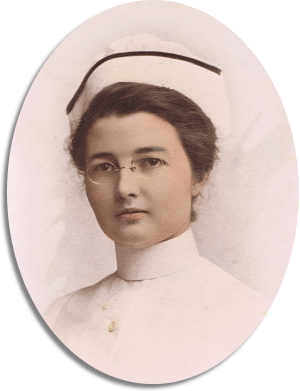
Grace Ellen Miller about 1915, around age of 26.
|
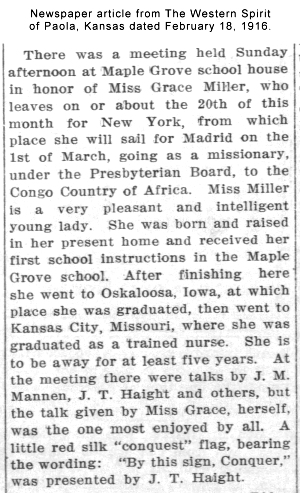
Newspaper article from The Western Spirit
of Paola, Kansas printed February 18, 1916.
|
Grace grew up on the family farm where her parents raised horses, cattle, hogs, and chicken among other animals. Her father was a beekeeper, grew corn, oats and various crops. Anna and the children helped to grow many fruits and vegetables for their own table in their large family garden. The boys were expected to work hard out in the fields and around on the farm with their father.
One-quarter mile from their house, she attended the 18x24 foot, one room, Maple Grove school that paid one teacher to teach grades 1 through 8. When she finished eighth grade, she went to school in Wellsville, beginning fall of 1904, at the age of 15.
|
Years later in a letter to Debbie Owen dated March 12, 1983, Henry described his older sister as "brown eyed like her mother, rosy cheeked, with heavy dark brown hair, in long braids. Grace was vigorous, full breasted when grown... Grace was always loving and agreeable, playful."
|
Anna encouraged all of their children to get a good education with the hopes of greater work opportunities. In the fall of 1905, Grace went to business school in Ottawa, Kansas. In May 1906 she graduated from the county high school. During the summer of 1906, Grace worked as a stenographer and typist in Kansas City, then in the fall attended the teachers training at Kansas State Normal School in Emporia, Kansas, about 85 miles from the Miller home. Grace was 17 years old.
Then Grace attended nurses training at Kansas City Hospital, Missouri but returned home after two years when she grew disgusted with the moral standards of those in training, according to Henry.
|
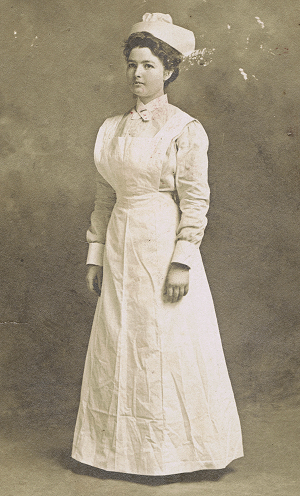
Grace Ellen Miller about 1910, around age of 21.
|
And so, Grace found herself back home in her late teens, without a firm direction in her life.
Henry goes on to say in his letter,
"When our brother Frank took up with some radical religionists who told us we were lacking unless we were sanctified, Grace tried to have the experience, shut herself in her room saying she would not come out till she had the experience."
This seems to have changed her direction. She attended classes at Central Holiness University near Oskaloosa, Iowa, where she used her secretarial training and worked in their school office to pay her costs.
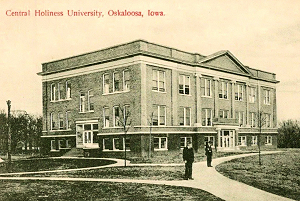
Central Holiness University about 1910.
|
The next fall, Anna and Grace convinced her youngest brother Henry, to enroll in Central Holiness University also, with the intention to get him off of the farm and away from a girl that wished to marry Henry. Together they rented a one room house where Grace did the cooking. Henry worked odd jobs while Grace continued her job at the school office to pay their rent and tuition.
|
At the end of the year at Central Holiness,
Grace heard about the American Presbyterian Congo Mission and their need for doctors and nurses on their mission field in Africa. She decided to return to nursing school at Kansas City Hospital, Missouri to become a medical missionary. She completed her training in December 1915.
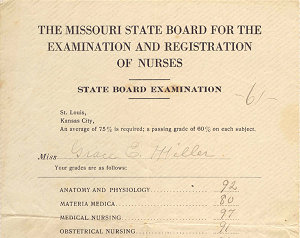
|
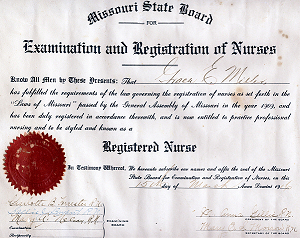
|
|
Registered Nurse Examination undated, but possibly from December 1915, since a farwell party for Grace was announced in her local newpaper on January 28, 1916.
|
Dated March 15, 1916, the certificate for Registered Nurse was issued to Grace E. Miller after she had already boarded a ship to Africa.
|
On February 20, 1916, Grace departed Rantoul, Kansas to begin her journey to Africa.
Following are articles from various publications which were written by Grace describing her trip and her work in the Congo region. At first she was just writing home to her friends and family, but when her mother Anna took the first letters to their local newspaper, The Miami Republican of Paola, Kansas, the editor printed them and the readers made it known that they loved it. The editor mailed free issues to the Miller family and to Grace in Africa in exchange for the letters.
Other newspapers such as The Western Spirit of Paola, Kansas and Capper's Weekly of Topeka, Kansas also printed a few articles on the subject.
The American Presbyterian Congo Mission asked their missionaries to write articles about their work in the mission field for publication in their own news, The Missionary Survey and The Presbyterian of the South.
Grace wrote most of the following articles. Sixten Edhegard wrote one article which has two versions. Grace most likely helped him with it, since English was his second language. Other articles that were written for the American Presbyterian Congo Mission by various missionaries that knew Grace and Sixten are also included below to give insight into their situation.

From Far Away Africa
Written by Grace E. Miller
Newspaper article from The Miami Republican
of Paola, Kansas printed September 15, 1916.
|
The following letter was written to
the late John T. Haight of Stanton-twp.
by Miss Grace E. Miller, daughter
of Mr. and Mrs. Sylvester Miller, who
live just across the line from Stanton-twp.,
in Franklin-co. Miss Miller is a
medical missionary at Luebo, Africa,
and the letter was received by Mrs.
Haight, who kindly permits its publication,
as it will be of interest to Miss
Miller's many friends and to all of our
readers:
Luebo, Africa, June 30, 1916.
Mr. J. T. Haight, Paola, Kansas.
|
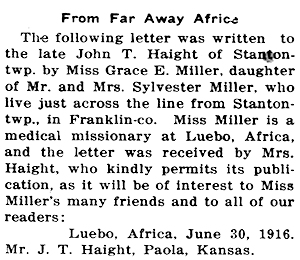
Newspaper article from The Miami Republican
of Paola, Kansas printed September 15, 1916. - Click to see entire article.
|
My Dear Friend:
I have thought
for some time of writing you a short
letter to let you know of our trip and
safe arrival in the fair land of Africa.
We were delayed some time in New
York. The steamer in which we were
to sail was delayed in sailing several
days. During that time we received
a message from our mission board forbidding
us to sail on the Roma on account
of war conditions. We finally
succeeded in getting passage on a
Spanish steamer. We sailed from
New York on the tenth day of March (1916).
We were very glad to start after so
many days of waiting and uncertainty.
A few hours, however, changed the
smiles of our party and most of the
other passengers to a more serious
look. Sea sickness! It must be experienced
to be described. Even the
three little ones in the party were sick.
I would have enjoyed going to bed, but
with everyone else sick I really did
not have time. We all survived, however.
I enjoyed the voyage to Cadiz, Spain.
Nothing of importance occurred except
being held up for inspection by a
French vessel. We arrived in Spain
on the 22d day of March.
Cadiz is an ancient city. We were
told it was founded before Rome. The
little narrow streets are quite puzzling,
especially when you cling to the
side of a building to escape the passing
donkey cart. Yes, they are that
narrow, and the sidewalks are wide
enough for just one person.
We were in Cadiz a little over a
day but we tried to see as much as
possible. We visited a museum (we
would call it an art gallery) and saw
some of the paintings of famous artists.
They were really wonderful. The
catacombs in one of the Catholic cathedrals
were especially interesting to
me. Far down in the basement we
saw the rooms for imprisoning those
who needed punishment. In the center
of one large apartment any sound
set in motion, shall I say echo? came
back thirty times. I thought it would
be a good place to sing.
We enjoyed our few days' journey
from Cadiz to the Canaries. We
reached there on Monday, March 27,
and went on shore in the Gran Canaria
Las Palmas. Fortunately we were
here only one day, as we secured passage
on a Portuguese steamer en route
for Loanda, Africa. The water around
the Gran Canaria is the most beautiful
I had ever seen! It is deep blue
until it rolls toward tbe shore, then it
changes into all kinds of beautiful
colors.
After we left the island we ran several nights without lights on account
of the dangers of war. We were so
glad when we were through that part
of the war zone. We crossed the
equator without any serious difficulty.
We were delayed several days at St.
Thome because of cargo to be unloaded. This island is noted for its cocoa
farms. The water about a mile from
the shore is even more beautiful
that at the Canaries. We could stand
on deck and see the bottom of the
ocean and hundreds of fish. The men
of the ship spent many hours fishing,
but with little success. So many
needle fish interfered with the catching of the larger fish.
We reached Loanda on the 14th of April. We were delayed here one week. It was really quite warm here, much warmer than at any place farther inland.
We were glad to leave Loanda, although time did not drag even here. I visited the hospital and was surprised to find such a large and well equiped institution. the prison, with its many, many prisoners, both men and
women, made me realize more than
ever the awful effects of sin upon humanity.
We left Loanda on the 21st
and reached Boma the next day. We
were here three days, then went on a
launch to Matodi, a day's journey.
From Matodi, after a night's rest, we
went on a little railroad. The train is
not very modern and not very attractive,
but it brought us safely to Hyceville,
where we spent the night. The
train does not run during the night.
We continued on our journey the next
day and reached Leopoldville in safety.
Here we found our mission steamer
waiting to take us up the river and to
our station. We left the next morning
and reached Luebo on the 12th day
of May, just two months and two days
from the time we left New York.
How glad we were to reach our destination! How glad everyone seemed to
see us. God has truly guided us in
safety and kept us from the dangers
which were hidden from our sight.
We are busy now. I shall not try
to tell you of our work in this letter,
as it is bed time. Give my best regards to all. Will you let Sarah Alice
read this, as I have so many things to
do I do not know when I shall find
time to answer her most welcome letter.
Sincerely,
Grace E. Miller.
(My native name:)
Mama Mukuacisa.

Another Letter From Miss Miller
Written by Grace E. Miller
Newspaper article from The Miami Republican
of Paola, Kansas printed September 22, 1916.
|
Miss Grace E. Miller, who is a medical missionary at Luebo, Africa, has
written another letter to her parents,
Mr. and Mrs. Sylvester Miller of
Franklin-co., near Stanton in this
county, from which we take the following
extracts:
|
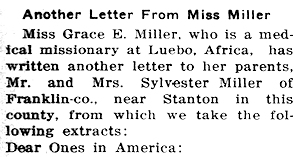
Newspaper article from The Miami Republican
of Paola, Kansas printed September 22, 1916. - Click to see entire article.
|
Luebo, Africa, June 30, 1916.
Dear Ones in America:
I suppose you cannot realize that
Africa is much like home. To-day we
had a real rain. It was cold and was
so dark at 1 o'clock that I had to light
a candle to study my lessons by. We
were very glad of the rain, as it had
been several weeks since we had one.
Miss F. will probably leave in two
weeks for America. Of course these
war times are times of uncertainty. I
am enclosing you a paper, but am sorry
the ants ate part of it. Dr. C.'s
baby is yet sick and the poor little fellow
does not seem to improve much.
The Doctor is all run down and nervous. (This was Dr. Llewellyn Coppedge.)
Well, I stop so many times and begin
again that I hardly know what to write.
I have been sending you letters on the
average of one per week, so notice if
you receive them all. I am sorry I
did not bring more table cloths, dish
towels, dishes, tea towels and such
things. I think of you all so often and
almost know you are not far away. I
am longing so to be able to talk to
these people. I am getting along fairly
well with the dialect. Probably by
the time I get home I'll be speaking it
more fluently than English. We have
plenty to eat, but are nearly out of
flour and are low on sugar and oil. We
burn candles almost entirely, so the
scarcity of oil will not worry us very much. I am feeling quite well, sleep
well, work some, study some and
think some. Just received a letter
frome home. Was so glad to get it,
also one from brother H. in Iowa. Your
letters were mailed the 6th of April
and this is June 30, but I feel I have
direct word from you by way of the
throne.
Thank you so much for taking so
much trouble with the grades. You
need not bother sending my diploma.
I passed any way. I enjoyed your letters.
So N. is married. I wish them
happiness.
I Would like to help with the farm
work and am looking forward to several
months with you all at home in a
few short years. I'd love to peep in
just now. I suppose you are just eating dinner
and we are ready for supper. We are not operating these days and I am glad, for I need all the time
I can get for my studies. The surgeon is still away. The sunrises and sunsets
are so very beautiful here. The
moonlight is wonderful, also. One
can almost see to read by the moon's
light. We have very nice native boys
and are all willing to work. We do
not have to work hard, for we are here
to teach and help them to learn to
work. These people are quick to understand
and respond readily. They
certainly enjoy learning. You may
ask as many questions about conditions
here as you like. I almost know
there are things I forget to mention
you would like to know.
Pray for the natives here. They
suffer much persecution from the Belgian
government. It is terrible the
way they are caught and forced into
Belgian service.
May God bless and help you. Love
to grandma and grandpa and much
love to you all.
My new name is Mukaucixa. We
pronounce it Moo-qua-chee-sa.
Lovingly yours,
G. E. M.

From Miss Grace Miller
Written by Grace E. Miller
Newspaper article from The Miami Republican
of Paola, Kansas printed October 6, 1916.
|
Luebo, Africa, July 18, 1916.
Dear Ones at Home.
|
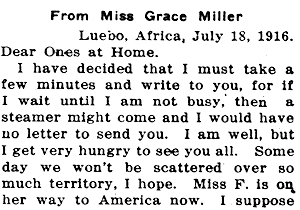
Newspaper article from The Miami Republican
of Paola, Kansas printed October 6, 1916. - Click to see entire article.
|
I have decided that I must take a
few minutes and write to you, for if I wait until I am not busy, then a
steamer might come and I would have
no letter to send you. I am well, but
I get very hungry to see you all. Some
day we won't be scattered over so
much territory, I hope. Miss F. is on
her way to America now. I suppose
by the time you receive this she will
be in America. Excuse the way I am
rambling over this paper, but I seem
to find no blotter, so write this way to
keep from blotting. We are having
very cool weather here now, and it is
very damp. Will be glad when the
rainy season comes, I think, for they
say it is more pleasant then. One of
our missionaries bas fever this morning.
It usually lasts two or three
days, when plenty of quinine is given.
Ten grains at once almost takes me off
my feet. The doctor is coming this
week. I have never seen him, but
they say he has red hair. Dr. C. is no
surgeon, so our operations are small
at present. Am so anxious for Dr. K.
and wife to come. At present I am at
a disadvantage to teach my boys and
girls, not being able to talk much so
they can understand. I will be so
glad when I show some signs of intelligence.
Ha! ha!
Next Monday is my birthday. Would
love to spend it with you. Have not
heard from Bessie in India since I
came to the Congo. Probably we will
have some difficulty in hearing from
each other. I told you in a previous
letter that we stay only three years
before we get a furlough. For fear
you did not receive that letter I will
repeat it again, as letters are very uncertain now. We have the nicest pawpaws here. They are something like
muskmelons, only better, also have
egg plants and bananas. I wish you
could have a bunch of the bananas.
We do not suffer for food, although
we have very little flour left at the
station. Of course we can get along
very well for awhile.
We had 195 at Sunday school, that
is, boys up to the age of 12 or 14 years
old. The natives do the teaching.
We have only five teachers for that
number and one of the teachers was
absent last Sunday.
Ethel, how do you like farming?
Have you learned to ride horses and
milk the cows? Does your dog keep
you plenty of company? Be careful how you hitch him to a sled when
there is snow on the ground; you
might get another fall. Did you have
plenty of mulberries this year? I almost forgot about the strawberries and
cherries. Hope the cold weather did
not catch them.
Did I ever tell you
how large our home is? Six rooms.
Think of it, I almost feel lost in it.
The kitchen is separate from the house
proper. The house is made of mud,
dirt floors, with mats to cover it.
This is July 21. Well, you see time
goes in the Congo as in America. We
live and move and work. It is five
months since I left home to come
here. We had some rain last night.
Give all the folks my love and tell
them I think of them often. The other day I met two little boys who had
a big beetle, which they wanted to sell
to me. This would be a capital place
to collect bugs. Brother Henry, I
wish you could have a chance at them.
They are all over the bouse and outside, and anywhere you might look you could see bugs.
Well, I must think about saying adieu.
With much love to you all I think of you and will you pray for me, that I may accomplish the work that He has given me to do. May the love of the Savior abide with you forever.
Grace Miller.
P. S. - I wish to thank the sisters of Spring Ridge and Stanton for the liberal and prompt response made for table linen, etc., and the many good wishes and words of cheer accompanying them. I am sure the Lord will bless each donor, for we have His propise that no gift however small goes unnoticed by our heavenly father. Again thanking you for your generosity and kindness, I am, yours truly, Grace's Mother.

In Far Away Africa
Written by Grace E. Miller
Newspaper article from The Miami Republican
of Paola, Kansas printed October 27, 1916.
|
The following letter is from Miss Grace Miller, a medical missionary in Africa, written to her parents, Mr. and Mrs. Sylvester Miller, of near Stanton:
Luebo, Africa, July 29, 1916.
My Dear Ones:
|
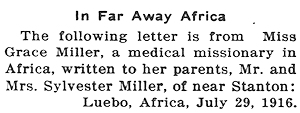
Newspaper article from The Miami Republican
of Paola, Kansas printed October 27, 1916. - Click to see entire article.
|
I think it is time
to write you a letter, although I have
just sent one. However, we are expecting
a steamer and I want to have
a letter ready then. I am hoping to
receive a letter from you, for I have
had only one since my arrival here.
Well, I had a birthday last Wednesday
and we went on a picnic to the
river. We were gone about three
hours, so you see how long our picnics
last here. (Grace was 27.)
Just received your good
long letter, so glad to get it; one from
brother Henry, one from one of the
girls at the hospital at Kansas City,
one from Bessie in India, written some
days before yours and two Christian
Heralds.
Do you ask if I ever get
lonesome? Well, you know how it is
to be busy, so you have no time to
think about it. That is the way with
me.
We have had a very sick woman
this week. She is nearly ready to
leave now. We had little hope for
her recovery and feel it is a great victory,
as they had tried their native
medicines and failed. We feel grateful
to the Lord for her recovery, as it will
probably mean much. I took her little
baby to the village this evening, to
find a woman to give it nourishment.
I found a very nice woman, who was
glad to help in time of trouble.
The
native houses are not very large,
usually one room without windows and
one door just large enough to walk in
by stooping. A mat on the floor and
a few cooking pots and some fire wood
is about all you see in the way of furniture.
The people have such a hard time
under the Belgian government. The
natives are all taxed, and if they are
not able to pay, they are captured for
soldiers. One of our women came to
us to-day crying, saying, "they have
taken my husband." I felt so sorry
for her, but we can do nothing about
things like that. It is very hard to
understand such things. One would
think that when they had suffered so
much in Belgium that they would deal
mercifully with these poor people, but
they treat them like brutes. They
throw them in prison and chain them
together. Some times epidemics of
fever break out, and in the morning
one may awake and find the prisoner
to whom he is chained lying beside
him dead, and he does not know how
long he will have to stay chained to
him. It is horrible to think of and the
natives have such a fear of the dead.
We have a patient here who is so poor
you can see each rib as far as from
our house to the barn at home. Truly
you can, and almost count them.
Money is the last thing a person in
America should send to Africa. It
would be a very difficult matter to send
it, anyway. We have very little use for
any, except what comes through
the office, because there is nothing
much to buy. The time when we will
think of money will be about two and
one half years from now, when we land
in New York City, with just enough
clothes to get to a dry goods store, just
enough teeth to give the dentist a
foundation to build on, and just enough
hair to need a wig. Nonsense, I shall
have enough uniforms to wear home,
unless I need shoes to appear in
America and my teeth are as sound
as dollars, but I sure miss toothpicks.
Now, thank you for the poetry, and I
appreciate every bit, too. Thank
Louise for the flower. It was not
broken one bit. I would love to see
all my little nieces and nephews. Give
them all a hug for me and tell them
I'm coming to see them some day. If
Jesus comes before I get there, we
shall just go to heaven and see each
other and I would be saved the
trouble of being sea sick. I would
love to run up and see Grandpa and
Grandma; give them my love.
Our rainy season will begin in almost
a month and then I hope to have
a garden and raise some lettuce and
cucumbers. I'd give a fabulous sum
for your cow and almost any price for
a stand of bees. It does seem so bad
not to have horses to work and no coal
to run engines with and no machines.
I would almost be rejoiced to see even
an old Western washer. We do not
have to wash, but I'd like to see them
wash some other way than pounding
them on a board or table. It wastes
so much water and soap to bunch up
the clothes and pound with them.
However, they look very well. I'm
afraid I don't write what interests you.
We had some pictures taken, but they
were no good. I was so sorry, for I
knew you'd like to see the new hospital.
I am feeling very well except
a dreadfully sore toe. You see, when
you read this letter it will be entirely
well.
We have such nice pineapples
now. I just wish I could send you
some, but you know one of the things
I miss most is going down cellar and
getting a can of fruit. Say, those
cherries sound well, but come to think
of it they are all gone, are they not?
I shot a hole in the wall, but did not
kill my rat. The rats are pretty bad,
so I am anxious to get my cat.
One tribe of natives near Luebo
makes cloth, but it is so very coarse
and stiff that they soften it by beating
it, and that makes it full of holes,
which must be mended.
Our hospital
cases are doing well. They sat up today
and looked so happy. A couple of
hours later I went back in the ward
and they were still sitting up. I told
them they should go to bed for awhile.
They acted as though they thought
now they were up they had to stay up.
They went to bed and each of them
seemed as though the bed was the
nicest place in the world. The women
carry water over a mile up hill, too.
My alarm clock is a great comfort to
me. I'd give $5 if it would just start
striking. Next time I come to Africa
I want a noisy one.
The boat is leaving
in the morning, so this will soon
be on the way. Jesus is an ever present
help. What a dreary thing life
would be without Him. May His
blessing abide with you. M., you and
E. must take good care of father and
mother.
Yours in Africa,
G. E. Miller.

Newspaper article from The Miami Republican
of Paola, Kansas printed December 1, 1916:
|
Mr. and Mrs. Sylvestver Miller are in
receipt of letters from their daughter,
Miss Grace Miller, who is a medical
missionary in Africa, dated September
2 and October 5, advising them of her
continued good health. She is working in the operating room, enjoying the work, but wishing to see home folks. The weather was quite warm and they planted flower seed, etc. They had buried one of the mission children.
|
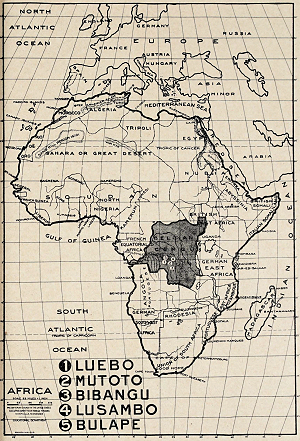
1917 Map of Africa. - Click to see larger image.
|

From Miss Miller in Africa
Written by Grace E. Miller
Newspaper article from The Miami Republican
of Paola, Kansas printed January 5, 1917.
|
Mr. and Mrs. Sylvester Miller of
Rantoul are in receipt of another very
interesting letter from their daughter,
Miss Grace Miller, a medical missionary
in Africa, which we are permitted
to publish. Mrs. Miller asks that
those of our subscribers who would
like to read more of these letters send
her a postal card, which we believe
many will do, as the letters are very
interesting. The letter follows:
|
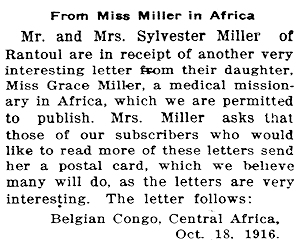
Newspaper article from The Miami Republican
of Paola, Kansas printed January 5, 1917. - Click to see entire article.
|
Belgian Congo, Central Africa, Oct. 18. 1916.
My Dear Ones at Home:
It has
been some time since you have bad a
letter from me. I am sorry, but I did
not have one ready when the boat
left. However, you may get this one
as soon as you would have another
sent several weeks ago. You see we
can start a letter from here, but we
have no way of telling how long it
will wait before it finds a steamer
from Africa.
Just received word a
little while ago that we could send
mail this evening, so I take this opportunity
of writing a few lines, as it
will reach a boat that is going to
Europe, and you may receive it before
Christmas. I wish you all a very, very
happy Christmas. We will think often
of you and almost wish we could step
in and bring you over here with us,
but of course that can not be.
We
will be having some warm weather at
Christmas time, as they say it begins
to be very warm about then. At the
present we do not mind the heat very
much unless it is necessary to be out
in the sunshine in the middle of the
day.
We have had the care of another
little missionary since my last letter to you. He is a fine little fellow
and is doing nicely. He is not quite
two weeks old, but we all think lots of
him. This makes the fourth little
missionary to arrive since I came to
Luebo, but two of them left us for
heaven shortly after coming here.
Well, I am glad to see in the Christian
Herald that war is a thing of the
past. I am glad, for it does seem
awful that the United States would
also be in that terrible business of
killing their fellowmen. I would
surely miss the Herald if it should quit
coming. I think every copy has come
safely through. It is the only paper
I receive. You know I am so sorry
that I did not have some little paper
like Dew Drop or Little Learners sent
me here, for I might be able to transate some of those little stories to my
little boys.
If you should ever think
of sending me money, just don't. Of
course if you should want to help the
missionary cause it is best to send
to the committee, but I meant personally. The best thing to do is to
order what you want and have it
shipped to me.
I think I will have to
order more shoes before my time is up
here. I am sorry, too, but of course I
would not like to go without them.
I will just include them in my next
order, or rather some of their other
orders.
Of course if I should decide
to get married I will probably have a
rather large order of my own to send
in. Nothing certain about it, as there
is no one here to marry, so there is
not much danger. I will give you
many, many warnings before such a
misfortune overtakes me in the heart
of the dark continent, but you see I
must indulge in some fancies, as
things go on much the same here and
you see the same people day after day
and eat the same things day after day
and do the same work day after day,
just like people all over the world, except
our climate is a little more depressing
than it would be if it would
snow a little once in awhile. We have
had a fine big rain and the Lapsley
has gone down the river to bring us
some more people.
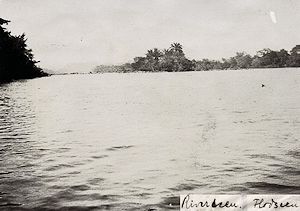
|
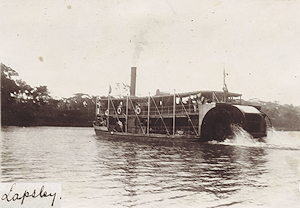
|
River scene. Flodscen.
|
Lapsley. The river boat, Lapsley.
|
I am in the hospital
writing. Not a great many patients
now and I am glad for Dr---
left Sunday and I am sure I would not
know what to do if some great thing
should happen. He will probably be
gone a week yet and I'm trying to
hold down his part of the work.
I am pulling teeth, yes, honestly, I am.
This morning a woman came in and
wanted two double teeth pulled. Well,
they never wait for them to get loose,
but when they pain they want them
pulled. Well, my heart almost failed
me, but I said "come on." I had one
man hold her head and it took all the
strength I had to get one out, but out
it came. We had a good many waiting
for medicine, so we left her until
it quit bleeding and then went back
to her and finished the dental work.
She paid us with two eggs. You see
they must pay for their medicine, so
they are not beggars. They pay mostly with corn and the little shells which
they use for money. I must send you
some of these things some time. I
mean shells, not corn, as their corn is
much like ours at home only the ears
are not as large.
It looks like it might
rain again this evening. I would like
to plant some flower seeds, but it
seems I shall never get at it. Well, I
must hurry. I am not going to read
over this letter, so you had better correct
all mistakes before passing it on.
I had a nice long letter from Robert
and Velma, which I enjoyed very
much. I think I must be as glad to
hear trom you folks as you could possibly
be hearing from me.
Also enjoyed
the letter from sister Elma. Would be so glad to see them.
I think they should send me their pictures. Henry, you must let me know how you get along. I am so anxious to hear where you are in school. Would like to have a letter for you, but couldn't. It takes a letter nearly two months longer to reach me from India, where Bessie is, than it does from the U. S. A. Is not that unexpected? I had a letter from her last week and she had not heard from me.
Her letter was written in June and I
received it in October.
I am glad you
are all keeping well. How much I
would like to see you, I can not say
and will not try to tell you.
We are
going to have a new kitchen. I will
be very glad, as the one we have now
is so dark and you can not expect the
boy to keep it clean, because he can
not see to. You know they can not
realize about dirt, for they are so accustomed
to it. When they eat they all sit around on the ground together
and eat from one pot with their
fingers. They are very liberal and
will share the last thing they have.
They eat only twice a day. The little
boys will see their dog has something
to eat even though they go hungry
themselves.
I have not had a fever
and have been here a little over five
months. Well, I must say it's time to
stop. I am enjoying my work and am
leaving it with the Lord as to the
amount of good my presence in Africa
is doing. It sometimes seems that
you can accomplish very little, but
we must not expect wonderful things
to be brought about by little people.
With loads and loads of love to every
one, I remain,
Yours most affectionately,
Grace E. Miller.

Who will send me the address of
the papers that daughter mentions in
her letter, also how many of The Republican readers would mail me a
card requesting a continuance of her
letters being published in The Republican
and their appreciation of the
same.
Mrs. Anna L. Miller,
Rantoul, Kansas.

The following is a letter that Grace wrote to her family. It was not published, but only meant for the family.
Mr. & Mrs. S. Miller
Rantoul,
Kansas
U. S. of Am.
Luebo, Africa, April 1, 1917.
My Dear Ones:
Just a few lines to you this afternoon so as to send it in the morning. Two small steamers came in this morning but no mail. I think one leaves in the morning so I want to get a word to you with it. The other probably will not leave before Tuesday as I will have time to write a longer letter to send by that.
Dr. Coppedge was called away yesterday morning to see a state or company man who is sick. It is a day's journey with hammock men. We think he will probably return tomorrow evening.
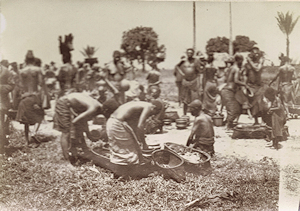
|
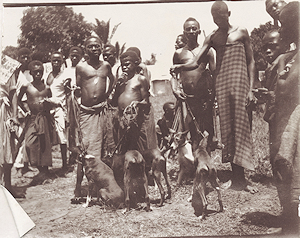
|
Scenes from the market Luebo. 1917
|
Scenes from the market Luebo. 1917
|
Dr. Coppedge removed my corns a few days ago and my feet are so sore. My only consolation is that I hope to have no more corns. Henry you spoke visiting my ward. You would have hard work making yourself see where it started and where it ended. We have a big shed where the men with sores stay. We have a good many bad ones at present. One little boy with the nails off of all the toes on one foot and swollen twice their natural size. One of the patients brought him home from the market. I must remember and tell you about the market in my letter tomorrow and I believe I have a picture of a little part of it.
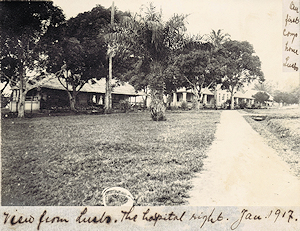
View from Luebo. The hospital right. Jan 1917. Our first Congo home, Luebo, at left.
|
Then we have a small brick house where the women with sores stay. At present we have no women staying in the hospital who have sores. Then the main building really has two wards and a small ward between. Henry, you remember the Men's Ward at the General. The three altogether would make one about that size. At present it is all and more than we need. We have some cases of malaria but we soon finish them and send them home.
|
Everyone is fairly well. None of the missionaries been sick since I have been here. I have had a few headaches but no fevers. One of the little boys in my yard told me the other day when he knew my feet were sore that they would pray God to make them well. I have five in the fence now. Sixten took a picture and I want to send it to the Survey so perhaps you will see it there.
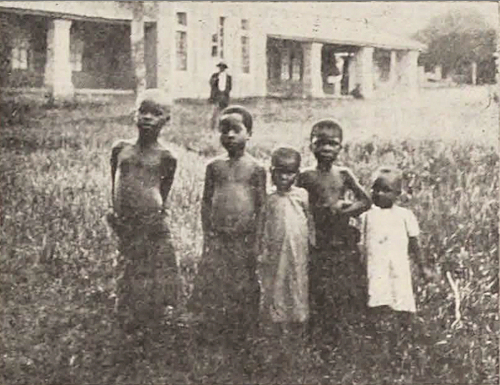
Well I will send this short letter in the morning for a few hours difference in starting a letter here may mean a difference of weeks in your receiving it.
With much love, Grace

From Africa
Written by Grace E. Miller
Newspaper article from The Miami Republican
of Paola, Kansas printed August 3, 1917.
|
Mr. and Mrs. Sylvester Miller of near Rantoul, whose daughter, Miss Grace E. Miller, has been a medical missionary located at Luebo, Africa, the past two years, very kindly send The Republican a part of another letter received from their daughter. We have published several very interesting letters from her, which have been read with great interest by our readers. To this letter is appended the announcement of Miss Miller's marriage to a fellow worker in the mission field, which is proof that the little god Cupid has dominion in far away Africa as well as right here in Miami-co., Kansas. With this letter is enclosed a photograph of a native grass hut or house, with a young native in abreviated costume beside the hut.
The following is the letter:
|
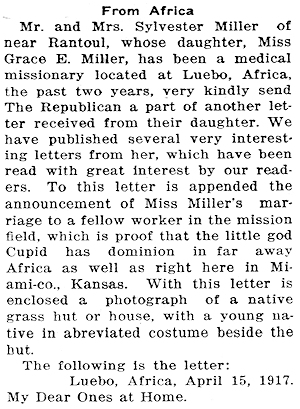
Newspaper article from The Miami Republican
of Paola, Kansas printed August 3, 1917. - Click to see entire article.
|
Luebo, Africa, April 15, 1917.
My Dear Ones at Home.
The Lapsley will leave in the morning and I think the mail will go again this week. I try to send by each mail because I suppose the letters stand many chances of never reaching you now.
The river is higher now than it has been for two or three years. The mosquitoes are worse, also. I never saw so many of them. We are afraid of malaria, but so far I have kept well.
I have not heard from Bessie for months. (a friend, a missionary to India.) I have a cat here. He wants to help write, and because I won't let him, he is making all the diyoyo (noise) he can.
A new station is to be opened soon. I may be sent there, as the Doctor's wife is a nurse.
I received a letter from mother, which was written the middle of January, so you see it takes a long time for them to reach me. I'm afraid I do not receive all your letters. I am sending you some pictures.
Last Sunday one hundred and three natives were baptized. They are very strict in their examinations. The Kellersberger's goods have not arrived yet. I suppose they will be here the first of September.
Glad to receive Capper's Weekly, so glad to get the other papers, also the Christian Herald. Mother, will you please keep on sending my birth certificate until you get a letter from me saying I have received one. You will do me a great favor and I will be so thankful to you. Never forget to pray for us, I feel you remember.
Yours lovingly,
Grace E. Miller.
Later: Mr. and Mrs. Miller wish to announce the marriage of their daughter, Miss Grace E. Miller, to Mr. S. Edhegard, May 1, 1917. Mr. Edhegard comes from Sweden, is of Swedish parentage, is highly educated, has been connected with the Luebo work for some time and is a Christian minister. Hundreds of natives witnessed the ceremony, which we will try to describe later.
Yours truly,
S. and L. Miller.

From Far Away Africa:
Written by Grace E. Miller Edhegard
Newspaper article from The Miami Republican
of Paola, Kansas printed August 31, 1917.
|
Mrs. Edhegard, who is a daughter of Mr. and Mrs. Sylvester Miller, who live in Franklin-co., just across the line from Stanton, went to Africa several years ago as a medical missionary. We have published several very interesting letters written by her to her parents and we will certainly be glad to have her story of an African romance. Her letter referred to above was mailed June 3 and is as follows:
The following is the letter:
|
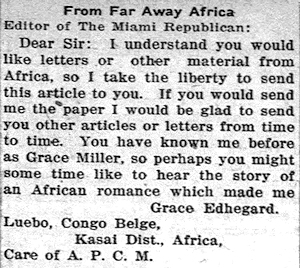
Newspaper article from The Miami Republican
of Paola, Kansas printed August 31, 1917. - Click to see entire article.
|
Luebo, Africa, June 3, 1917.
Editor of The Miami Republican:
Dear Sir: I understand you would like letters or other material from Africa, so I take the liberty to send this article to you. If you would send me the paper I would be glad to send you other articles or letters from time to time. You have known me before as Grace Miller, so perhaps you might some time like to hear the story of an African romance which made me
Grace Edhegard.
Luebo, Congo Belge,
Kasai Dist., Africa,
Care of A.P.C.M.
OUR LITTLE FRIENDS.
And who will care for the little orphans. What is to become of them? Can we simply ignore them and turn them aside to die? This is a problem which is being brought more and more forcibly to our attention. When these unfortunate little ones are brought to us in the hospital, having been neglected until disease has attacked their little bodies, then when they have become strong once more must we turn them out to perish or return again to us sick and miserable? We cannot make an orphans' home of the hospital, as we need all our room for the sick people. I would like to call your attention to a few of our little waifs who are still with us.
Little Abraham is now a little past two years of age. When he was a tiny, tiny baby he was brought almost dead to Miss Fair, who was then the only nurse at the station. He was a pitiful sight and everyone who saw him thought he could not possibly recover. But these little one show wonderful vitality sometimes, and with careful nursing he was well once more. As he had no friends he had been cast aside to die. His mother was dead, and as no one else wanted him he became hospital property. He sleeps in a big box and is very happy because he has such a nice house. He is very seldom sick, rises early in the morning and plays about until time for morning prayers. When he hears the call for worship he comes silently into our house, sits quietly through the service and tries to join in repeating the Lord's prayer. He knows some of it, but misses most of it and comes in very strongly with the amen. On Sunday he never forgets his shells to put into the collection box. The natives use shells for money, and Abraham would think it very bad to go to church without his shells.

Kayoka, standing next to Abraham in the picture, is probably five years old. He was living with a brother in the village but was practically without care. He wandered into the hospital yard one day and was a sight to behold. His poor little hands and feet were filled with jiggers and he was in great distress. You who do not know about jiggers cannot imagine his pitiful condition. Jiggers are small black insects, about twice as large as our chiggers, which bury themselves in the flesh, form a bag and fill it with eggs. When fully developed this bag is as large or larger than a good sized pea. When these are removed they leave a hole in the flesh, which of course is quite sore and if not cared for will become infected and probably in this climate cause a bad sore. If the jiggers are not removed they finally burst the bag, not only causing a worse sore, but scattering hundreds of eggs, which are ready to hatch and enter other toes and fingers. Poor little Kayoka had hundreds of jiggers, but he was very patient, crying pitifully to himself as they were removed and the many sores were dressed and bandaged. It was several days before they were all finished and then he was happy. Had he stayed a few days more in the village he would no doubt have lost several of his toes and fingers. Little Katoke who came to us just recently, has only one nail left on one foot, having lost the others from jiggers, and his foot is sore and badly swollen and infected yet.
Cibuabua is the only little girl we have kept for a long time after she was well. She is possibly four years old, a very bright little lass. A more loving little girl could not be found anywhere and she seems to be simply starving for affection. One of the missionaries found her one Sunday, or rather she found him and clung to him so he could not leave her. On inquiring he found her parents were dead and anyone who might have cared for her had deserted her, and she was left to shift for herself. Covered with sores and very thin and dirty, she was an object to arouse pity in anyone. Having been compelled to steal for a living, it was hard for her to realize that it was no longer necessary and that she would have plenty to eat without stealing it. She soon felt at home among the children, but was never satisfied unless some special attention was showed her. After she had been with us for several weeks and was quite well and strong again, we sent her to the girls' home, where she will have good care and training.
Mpanda Nxila is a little half-cast boy who lived with his grandmother. He was so thin he could scarcely walk, for she was too old to be able to find them both enough food. He had sores on his feet and legs, so we persuaded
her to leave him with us. Now he is well and happy, but if he should go away with his grandmother he would soon be in his former condition. He and Kayoka are about the same size and are always together, but I have never seen them fight or quarrel.
Musonguela is the oldest boy we have. His father drinks and the child does not want to live with him. The parents are separated and live in different villages, but if Musonguela should go to live with his mother then his father would steal him. He does not object if he lives at the hospital, so this is home to him. He works to pay his board and we have always found him trustworthy. He is probably ten years old.
And do the other children do nothing but play? Oh no, they have their little tasks which they must do every day. They carry the corn which the people bring in the morning to the dispensary to pay for their medicine. In the afternoon they sweep and run errands. They are always glad to help and it is surprising to see their interest in things. Mpanda Nxila, who is about six years old, decided one morning he would like to help operate, and standing on a chair to be able to see, he watched a long, tedious operation and was as quite as a mouse. Of course they are sometimes naughty and must be punished. They are full of mischief like all children and play all kinds of tricks on each other, but they are also happy and contented.
What will be the future of such unfortunate children as these? We do not know, but we hope the ones we have the privilege of helping will grow up to be men and women who serve and fear the Lord. At least we try to bring them up so that those who have known the deepest misery of heathendom may one day go forth and tell their own people about Him who bore all our sins and miseries in His own body. And we pray that He himself may add His blessing to our feeble endeavors.
Grace Edhegard.
This article was also printed in the January 1918 issue of The Missionary Survey. The photo of the orphans above was taken from that issue.

A Movie Show in Congo Land
(Version 1)
Written by Sixten Edhegard
Newspaper article from Capper's Weekly
of Topeka, Kansas printed October 20, 1917.
|
We would like to express our appreciation of Capper's Weekly, which we receive in Central Africa, in the Congo, the heart of Darkest Africa. We receive four or five when the mail finally comes. It comes to us addressed to Miss Grace Miller, but since romances may occur even in such an uncivilized country as Africa, I now have the pleasure of sending to your paper an article written by my husband.
GRACE E. EDHEGARD (MILLER).
|
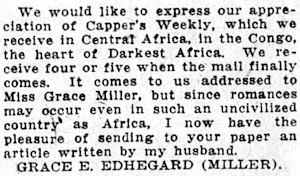
Newspaper article from Capper's Weekly of Topeka, Kansas printed October 20, 1917. - Click to see entire article.
|
To the Editor of Capper's Weekly.
Everything the white man has, his manner of living, his behavior and actions are subjects for the Congo negros' wonder and amazement. In the eyes of the black man he is almost omnipotent, all-knowing and, with unlimited riches.
One of our missionaries had given several shows with a little moving picture machine he had received as a gift. Then a much better and larger one arrived from America.
It was 7 o'clock in the evening and the darkness had already a long while rested over the mission station. A blanket and a sheet was put up between two poles in the shed we call the church. The chicken boy was ringing the big bell with all his might to bring the people together. I, myself, with a lantern in my hand and my pockets full of postcards and photographs stumbled along in the darkness seeking the narrow path, the other missionary after with the machine. The shed was
already filled to suffocation with a noisy and interested audience who were explaining to each other what was going to happen.
The first picture to appear on the sheet is a likeness of the oldest missionary and the rest follow in succession. They are soon recognized and applauded, altho in their white stiff collars and peculiar clothes they appear not a little queer. We have already warned our audience if they do not keep quiet and "peace" is not satisfactorily observed we shall finish and go home. Then satan himself appears on the cloth. That he would some time come back was very natural. They who were sitting closest had a hard time to decide whether he were harmless or not. Others were making grave threats. All were crying and stamping with their feet and clapping the hands and shouting as only children of nature can do.
After several unsuccessful attempts to give them an explanation, "peace" was restored only when another picture was unfolded before their wondering eyes. In beautiful succession came steamboats, landscapes, high houses, railway trains, etc., things they could not imagine were in existence, and in spite of all our assurances that everything was a reality we could not convince them. They were more than surprised to see white snow, which we told them was a kind of rain falling in the cold season in "Komputu," which is their name for every foreign land, and astonished to see water which by the cold was made so hard that one could walk on it. How could it be possible for those people to tie iron pieces on their feet and run on water as the picture showed? Angels with white wings and glittering dresses were also very interesting pictures.
When at the close an old chief, who according to his own statement and that of others, is supposed to be 3,000 years old, came to view a photograph of him I had taken, neither their good sense, behavior or quietness could endure it longer, the noise exceeded all possible description and we had to finish the entertainment, which had lasted a little more than one hour.
The next day came a crowd of those who had seen the pictures the night before and asked if the devil was really so terrible as they had seen him on the sheet. When I told them he was not only so bad, but much worse, they all pledged that from that day henceforth they would never have anything to do with him.
SIXTEN EDHEGARD.
Mission Luebo District, Belgian Congo, Africa.

Foreign Missions
Written by Wade C. Smith
WADE C. SMITH, Editor
Magazine article from The Missionary Survey printed November 1917.
Published monthly by the Presbyterian Committee of Publication, Richmond, Virginia
|
THE submarines have evidently intercepted some of our African mail. One letter that found its way through brings the information that Miss Grace Miller, who went out a little more than a year ago as a trained nurse to Africa, was married to Rev. Sexton N. Edhegard. Some other letter which must have been written giving the date and circumstances of the event has not yet found its way through.
|
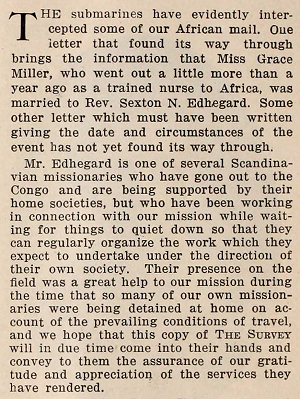
Magazine article from The Missionary Survey printed November 1917. - Click to see entire article.
|
Mr. Edhegard is one of several Scandinavian missionaries who have gone out to the Congo and are being supported by their home societies, but who have been working in connection with our mission while waiting for things to quiet down so that they can regularly organize the work which they expect to undertake under the direction of their own society. Their presence on the field was a great help to our mission during the time that so many of our own missionaries were being detained at home on account of the prevailing conditions of travel, and we hope that this copy of THE SURVEY will in due time come into their hands and convey to them the assurance of our gratitude and appreciation of the services they have rendered.

Foreign Missions
Written by Wade C. Smith
WADE C. SMITH, Editor
Magazine article from The Missionary Survey printed June 1918.
Published monthly by the Presbyterian Committee of Publication, Richmond, Virginia
|
Our readers will remember that Miss Grace Miller went to Africa as a trained nurse about two years ago. A short time after her arrival on the field she was captured and carried into the Camp of Matrimony by Rev. S. N. Edhegard, a missionary from Sweden, who came to Luebo and has been working with our mission while the disturbed situation connected with their work, growing out of the war, remains. For the present he is for practical purposes a member of our mission, and it is possible that he may become a regular member of it in the near future.
Mr. and Mrs. Edhegard were sent to Mbua Matumba, where we expected to open a new station. There has been some hitch in the negotiations with the Congo Government with reference to a concession at this point, which we hope will not permanently interfere with the plans of the mission. Meanwhile there will be no difficulty in finding a place within the bounds of the mission where these friends can do a useful work.
|
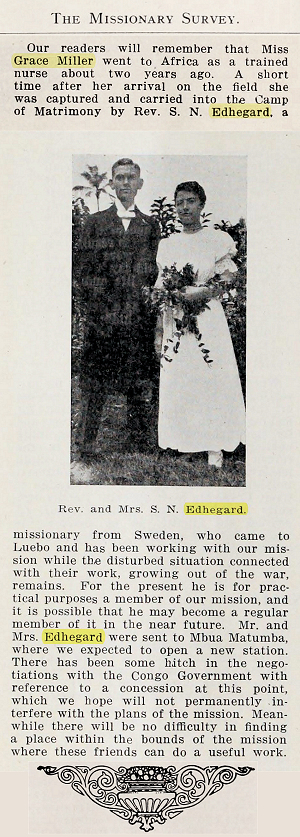
Magazine article from The Missionary Survey printed June 1918. - Click to see entire article.
|

A Movie Show in Congo Land
(Version 2)
Written by Sixten Edhegard
Newspaper article from The Miami Republican
of Paola, Kansas printed March 22, 1918.
|
Mr. and Mrs. Sylvester Miller of near Rantoul have just received a letter from their son-in-law, Mr. Edhegard, who is a missionary stationed at Luebo, Congo Belge, Africa, which tells interestingly of the effects of motion pictures on the natives there, which they kindly send us for publication. Mrs. Miller writes that her daughter Grace, who went as a medical missionary to Africa several years ago, where she met and married Mr. Edhegard, will soon write them a letter, which we may also have for publication. We have published several of her letters, which have been very interesting and were read with much interest by our subscribers. The following is Mr. Edhegard's letter:
|
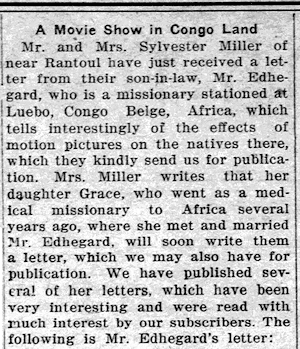
Newspaper article from The Miami Republican
of Paola, Kansas printed March 22, 1918. - Click to see entire article.
|
To the Editor of Capper's Weekly.
Everything the white man has, his manner of living, his behavior and actions are subjects for the Congo negroe's wonder and amazement. In the eyes of the black man he is almost omnipotent, all knowing and, with unlimited riches.
One of our missionaries had given several shows with a little moving picture machine he had received as a gift, then a much better and larger one arrived from America.
It was 7 o'clock in the evening and the darkness had a long time rested over the mission station. A blanket and a sheet were put up between two poles in the shed we call the church. The chicken boy was ringing the big bell with all his might to bring the people together. I with a lantern in my hand and my pockets full of post cards and photographs stumbled along in the darkness seeking the narrow path, the other missionary after with the machine. The shed was
already filled to its limit with a noisy and anxious audience who were trying to explain to each other what was going to happen.
The first picture to appear on the sheet is a likeness of the oldest missionary, and the rest follow in succession. They are soon recognized and applauded, although in their white stiff collars and peculiar clothes they appear not a little queer. We have already warned our audience if they do not keep quiet and peace is not satisfactorily observed we shall finish and go home. Then satan himself appears on the canvas. That he would some time come back was very natural. They who were sitting near had a hard time to decide whether he was harmful or not. Others were making grave threats, all were crying and stamping and clapping the hands, and shouting as only children of nature can.
After several unsuccessful attempts to explain to them, peace was restored only when another picture was unfolded before their wondering eyes. In succession came steamboats, landscapes, high houses, railway trains, etc., things they could not imagine were in existence, and in spite of all our assurance that everything was a reality, we could not convince them. They were amazed to see white snow, which we told them was frozen rain falling in "komputu," which is their name for "other lands," and astonished to see ice and that people could walk on it - it surely could not be true. How could it be possible for these people to tie iron pieces on their feet and run on water? Angels with white wings and glittering garments were very wonderful.
When at the close an old chief, who according to his statement and others, is supposed to be 3,000 years old, came to view, (a photograph of him I had taken), neither their good sense nor behavior could endure it longer. The noise exceeded all possible description and we closed the entertainment, which had lasted over an one hour.
The next day came a crowd of those who had seen the pictures and asked if the devil was really so terrible as they had seen him on the canvas. When I told them he was not only so bad, but much worse, they all pledged that from that day henceforth they would never have anything to do with him.

A Missionary Cat.
Written by Grace E. Miller Edhegard
Newspaper article from The Miami Republican
of Paola, Kansas printed March 29, 1918.
|
Mrs. Grace Miller Edhegard, who sends us the foregoing very interesting letter, is the daughter of Mr. and Mrs. Sylvester Miller, who live near Rantoul. She went to Africa several years ago as a medical missionary, where she met and married Mr. Edhegard, who is also a missionary there. The Republican and readers will be more than pleased if Mrs. Edhegard will send us accounts of the two weeks' trip in the Congo, also of her meeting with her husband and her marriage. We will look for these lat- er. As will be seen by the date, her letter was written December 4, and was received here last Sunday, March 24, requiring three months and twenty days to make the long trip from Africa to Paola.
|
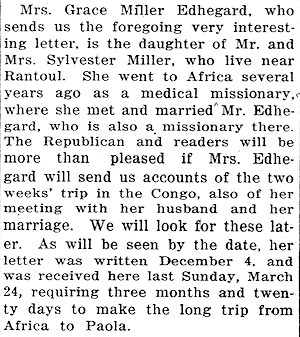
Newspaper article from The Miami Republican
of Paola, Kansas printed March 29, 1918. - Click to see entire article.
|
Mbua Matumba, Africa, Dec. 4, 1917.
care A. P. C. Luebo, Congo, Belge.
Editor of The Miami Republican:
Dear Sir: I am enclosing you herewith a small article which I thought
would be interesting at least to children. If you care to print it you are
free to do so. I am finishing a long article about our two weeks' trip in the
Congo, which I would be glad to send
you for publication if I knew you cared
for it. The trip was quite interesting, although tiresome, and I thought
would be even more interesting to
those who like to read about a land
where the people are so little civilized as we find them here. If you would
like to have it, just let me know, and
I will send it later. Remember, however, that it takes probably three
months for your leter to reach me and
that length of time for an answer.
Hoping that all your Miami Republican readers are in the best of health
and still enjoying the paper, I am,
Most respectfully yours,
Grace Miller Edhegard.
P. S. I think it would make an interesting story if I should describe my
meeting with my husband and our
marriage in Africa and the life of
traveling since. Do you think so?

A Missionary Cat.
Written by Grace E. Miller Edhegard
Perhaps you think it strange that a
cat could be a missionary just like
real people, but I think you will agree
with me before you have finished reading this little story. You may think
it would have been better to have called him the cat of a missionary, but I
cannot agree with you, because are not
people who help missionaries often
called missionaries, too? Besides, Pele
not only helps missionaries but he is
somewhat of one himself. He once
was only a common heathen kitten,
and although he has still some heathen ideas and ways, yet we think that
he has greatly improved.
Rats are very common and plentiful and become very troublesome in
Congo land. They seem to think that
the house belongs to them, especially
after dark, and no matter how much
you need a good night's sleep and want
a quiet hour, they proceed to romp
everywhere and have a regular jubilee
right in the middle of the night.
Well, things were becoming quite
serious in one missionary's home, for
not only did these pests keep a continuous uproar at night, but they also
insist on eating clothes and letters
and other things. Poison failed to
kill them, so as a last resort it was decided that a cat was a necessity. Pele
was brought from the native village,
a poor little heathen kitten. He was
very homesick at first and refused to
eat, and it was necessary to coax him
by giving him tempting morsels from
the hand. Although he seemed a harm-
less cat, yet the cowardly rats respected his power so much that peace
reigned once more and it was possible
for the kitten's new master to get a
good rest and leave his papers on his
table at night without their being eaten while he slept.
Pele became much attached to his
master and when he left on a trip to
visit some distant village he hunted
everywhere for him and sometimes it
seemed that he would pull all the
curtains from the windows and clothes
from the tables unless he found that
for which he was seeking. He was
very happy on his return, and his delight was quite evident in his change
of action.
The usefulness of Pele was without question, and when it became
necessary to remove permanently to
a distant village, a journey of nearly
two weeks by hammock, of course
Pete, who had now become a large cat,
must be taken along. Poor puss must
have realized that traveling in Congo
for several days would not be very
pleasant, and in spite of his love for
his master and mistress he ran away
and could not be found when the time
came to start. Regretfully they went
without him, thinking of the times
past when they longed for peace and
quiet at night and of the times afterward when, because of puss, they had
been able to live free from the tormenting rats. Fortunately shortly after their departure Pele thought it
safe to venture into the open again, but
he was at once put into a kind of native basket and sent after the party.
At midnight that night he awakened
his owners by his wild and frightened crying. He was very much distressed and did not become reconciled
until taken from his jail and tied inside the house near their beds. Every
day when the caravan was ready to
start he began to cry and did not stop
until night when they stopped to
camp. In fact, just as soon as his
basket was in sight in the mornings
his wailings started. Poor puss, he
thought it a very poor life during the
day, but was quite well satisfied at
night. When the first week was ended and the caravan stopped for a few
days at a mid-station, before going the
cat seemed to feel at home wherever
his friends were. He did not like to
be left alone at night and insisted on
taking walks with them, but during
the day was very well satisfied if he
only had something to eat. At last,
the time of starting on the remainder
of the journey came. Puss seemed
to realize that something was to happen, for he was uneasy all the morning, and although they tried to reconcile him he again commenced his crying. This time, however, he had a
more comfortable basket, and when
it was covered with a dark cloth and
tied securely to the pole of the hammock, it was a very good sleeping
place for him, and after some time
he made this discovery and had many
good naps instead of continually struggling to escape. He did not altogether give up the attempt, however, and
one day escaped on a big plain. This
plain was the very worst place he
could have chosen for a home, for it
was only a desert waste and starvation was certain. How the hammock
men did chase poor puss and he thot,
I suppose, they would kill him and did
his very best to get away, but it was
useless, and they came triumphantly
back and Pele was so out of breath
they though for awhile he would die,
but he was only worn out and needed
a fresh breath.
The natives are not accustomed to
treating animals with kindness, so it
was a queer sight, they thought, when
food and water were provided and
kitty's comfort considered. As new
villages were passed, many of them
where a white woman had never been
before, the natives were much excited
and made plenty of noise. This frightened the cat and he would cry pitifully. As they could not see into the
basket but only hear the cries, the
natives said there was a baby in the
basket and thought they had been
treated badly because "mama" did not
show them the baby. The men in the
caravan told them over and over it
was an animal and that the white
"mamas" did not carry their babies
shut up in a basket.
The tiresome journey was at last
at an end. Pele was probably one of
the happiest of the party and he proceeded to make himself at home. He
is perfectly satisfied now except when
left alone, and that he does not like
at all. He refuses to stay alone in
the evening, but takes his walk when
his friends go out. He is being a missionary every day by showing the natives they should treat animals with
kindness.
In this article Grace promised to write about how she met and became engaged to Sixten. Many of her letters from the Congo never arrived in America. We can only assume this was one.

A Journey Through the Congo.
Traveling in Africa - Preparing for the Journey - Day 1
Written by Grace E. Miller Edhegard
Newspaper article from The Miami Republican
of Paola, Kansas printed May 10, 1918.
|
With pleasure we have the privilege
of presenting herewith another very
interesting letter from Mrs. Grace
Edhegard, daughter of Mr. and Mrs.
Sylvester Miller, of near Rantoul, who
is a medical missionary located at
Luebo, Congo Belge, Africa. She writes:
|
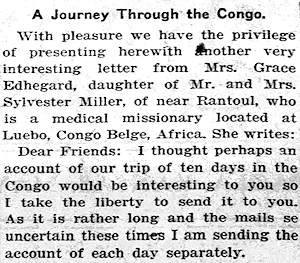
Newspaper article from The Miami Republican
of Paola, Kansas printed May 10, 1918. - Click to see entire article.
|
Dear Friends: I thought perhaps an
account of our trip of ten days in the
Congo would be interesting to you so
I take the liberty to send it to you.
As it is rather long and the mails so
uncertain these times I am sending the
account of each day separately.

A Journey Through the Congo.
Written by Grace E. Miller Edhegard
Perhaps you would be interested to
hear about the preparations necessary
to be made when moving in the Congo,
especially when there is a long journey
ahead. One who has never travelled
in this country cannot imagine how
much hard work must be done before
a person is ready to leave civilization
and go into the heart of a heathen
country and start a new home. Although missionaries do not have a
great many things, yet when the mere
necessities are packed in boxes not
weighing more than one hundred or
one hundred and twenty pounds, you
almost consider yourself far from being a pauper. The boxes must be
large and heavy, because they are
carried by native men who are human.
They tie the box to the middle of a
pole, and with the ends of the pole on
their shoulders, the two start upon
their journey. The path is often very
narrow and sometimes the way goes
straight up and down the hill. It is
really necessary to pull ones self up
by roots and shrubs growing by the
path, and when the top is reached it
seems that if another hill is in sight
it will really be more that you can endure. How the men climb these places
with their loads I have never been
able to understand.
Well, we started to pack nearly two
weeks before we intended to start and
sent one caravan on ahead. When the
day of departure arrived we still had
a little left and we worked as hard as
we could, but when the noon hour came
around we still found some things yet
unpacked. How you puzzle over the
best place to put each thing. What a
problem to know just what you might
need in the path and before you will
be able to open your boxes and trunks
again. At last the chop boxes for the
road and other articles which we expect to use on the way are ready and
we decide that it is the best thing to
have a little something to eat before
going. Fortunately for us, our friends
were kind enough to invite us to eat
with them before leaving and we surely
did justice to the dinner. After the
meal we must say good-bye to all who
are to be left behind, and as there are
eight families it is well toward the
middle of the afternoon before this
painful task is completed. Some way
it is always a great relief when this
part is over and you can be left alone
to think it over and reconcile yourself to your new circumstances.
It is nearly four o'clock, but since
we do not have a long journey before
reaching the place to spend the night
which our schedule gives it is just as
well it is not earlier, because the sun
is very hot up until three-thirty or
four o'clock. Can you imagine us as we
start? We do not have a horse and
buggy, nor a car, not ever street cars
or railroad trains, and it would be impossible for a white woman to make
such a journey as lies before us
on foot. It would really be quite difficult even for her husband, for I am
sure that he would be ready to have a
long spell of fever by the time the
destination was reached. The natives
carry us. No, not on their backs, but
in hammocks suspended on long poles.
These poles rest on their shoulders in
the same manner as the poles of the
box carriers. Many of the missionaries
have hammocks made of canvas, but
these we had were made of a pliable
kind of vine which is very strong and
can be woven into any shape desired.
These hammocks were very comfortable when you have two or three
cushions to relieve the tension of the
muscles. We have six men apiece and
they carry from two and a half to three
hours by turns. Sometimes the way is
tiresome to them, but as we walk up
and down the hills a good hammock
man looks forward to the road life
with joy rather than with dread. They
are anxious to be off now, for some
of these men come from this far
section of the country and have not
been back to their old home for years
and they are hoping after the two
weeks of traveling to greet at least
some of those whom they have not
seen for so long.
With a farewell look to the station
we go down our first hill and our dear
old home is lost to our sight. Will we
ever see it again? We cross the river
in a boat and go up a hill and now
we feel we have really started on our
long and tiresome journey. Were we
traveling in a civilized country and
with the conveniences which this civilization affords we would not think
much about it, for it would mean only
a couple of days, perhaps not so long
as that. How glad we are now that
we do not have far to travel before
the first stop, for we are both so tired
after the day of work. It is dark soon,
but with a nice moonlight it is so
pleasant to travel. We safely reach
the house of the chief with whom we
are to spend the night. By this we mean
he is so friendly that he divides one of
his houses with us or rather shares it
with us. The house is quite large,
having three rooms, and he removes
everything from the center one and
gives us the right of way. Fortunately
one camp bed and chair arrive at
about the time we do, so we can get
a little rest. We look and look in vain
for the rest of our camping things, but
through some misunderstanding they do not arrive, so we content ourselves
the best we can.
Back of the house in which we stay
the chief has a semi-circle of houses
which are occupied by wives. This
chief is not a young man. In fact, one
of his boys is probably twenty years
old. This old chief was at the hospital
for some time, also this young man and
his mother, so it seemed like meeting
old friends to see them again. The
tribe is not very large, but they are
among the most civilized of any of the
heathen tribes I have met. Not in the
matter of religion, but in regard to
their ambition to work and their interest in foreign things. They are very
friendly, and to show this the chief
brings us a goat. It is almost
impossible to accept this gift, but if
one refuses the gift of a native they
are grievously offending him. Then,
too, when a native gives a gift he always expects one in return, which
amounts in value to more than the one
he has given. We explain as best as
we can that we have just started on a
long luendu or journey but if he would
like to give us something we could
take, a chicken or some small gift, as
our men were already well loaded. He
seemed to understand the situation and
in a short time brings a chicken and
about two quarts of rice. In a few
minutes one of the wives feels it her
duty and privilege to give something,
so she comes with a chicken and some
more rice. Of course we accept quite
graciously, because it would be very
poor policy to refuse and lose all posibility of being able to do work there
through the mission teacher. The rice
we cook for the hammock men, who
are always glad to receive something
to eat, because then they do not have
to spend the money which has been
given them to buy food on the road. I
should say "salt," for the money of the
native, in most cases, is salt, heads or
shells.
In vain have we waited for our camp
goods to arrive, so we boil a few eggs
which were given us just before leaving
and after eating these we feel a little
stronger. As we are both so weary
we find we can both rest fairly on one
camp bed. I must admit, however, it
was a little bit crowded, but that is
only a start in road life. The natives
always build a fire in their rooms and
close all openings where air might enter, and in spite of the smoke they
sleep peacefully. But how we did feel
it in our eyes and throats. Well, we
forget our troubles in a short time in
the sleep of the traveler, but at midnight are awakened by cries and
shouts, but that is the starting of
another day, so we must wait until the
beginning of Tuesday, the second day,
before telling you about it.
GRACE EDHEGARD.
Grace says the trip took ten days. Some of her letters about the trip may have been missing.

A Journey Through the Congo.
Traveling in Africa - Day 2
Written by Grace E. Miller Edhegard
Newspaper article from The Miami Republican
of Paola, Kansas printed April 26, 1918.
|
Some time ago we published a letter from Mrs. Grace Edhegard, daughter of Mr. and Mrs. Sylvester Miller, who live near Rantoul. Mrs. Edhegard is a medical missionary stationed at Luebo, Congo Belge, Africa, and in her previous letter gave incidents of a trip which she and her husband made there. In the following letter, which is dated January 22, 1918, she tells of incidents in the second day of their journey. This letter was received last Monday:
Editor of The Miami Republican:
|
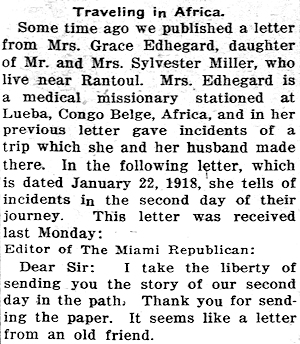
Newspaper article from The Miami Republican
of Paola, Kansas printed April 26, 1918. - Click to see entire article.
|
Dear Sir: I take the liberty of sending you the story of our second day in the path. Thank you for sending the paper. It seems like a letter from an old friend.

Traveling in Africa.
Written by Grace E. Miller Edhegard
A little after midnight, as I started to say before, we were awakened by cries and shouts and we arose to see what might be the matter. When we left the village the day before our cat ran away, and although captured several times had succeeded in making what we thought a final escape. We now learn, however, that he made his appearance shortly after our departure and was sent on to overtake us in the path. Of course we were delighted to see him, although disturbed in the middle of the night, for he was a good cat to keep away the rats, and cats were not inhabitants of the part of the country to which we were going. Perhaps it was a good thing for us that we had to stir around a little even though near the wee small hours of the night, for when morning came we were so stiff lying on that narrow cot that if we had not stirred some perhaps we would not have been able to move at all. "Every cloud has a silver lining." After puss quieted so we could sleep we tried to forget the smoke and cold and worries of the delayed caravan, and went to sleep.
We are routed out again by the hammock men, whom we had sent to look for the delayed box men. We had feared they might have misunderstood the path and gone another way, but the report convinces us that they have not left the place from which we started. In spite of the lateness of the hour we decided to take another nap, for we could not start in the path before the arrival of the men. We felt we could go no farther before we were convinced that our box of food would reach us sometime during the day, for we felt the need of some nourishment.
It was nearly ten o'clock when the box men finally came and we were able to start upon our way. This is very discouraging, for we have a long trip to make, but we still have to content ourselves with a shorter journey to-day, because the men have already traveled three hours and also because we are determined they shall not be far separated from us again. We stop about 3 in the afternoon and find a house large enough for two. That means large enough to put in two cots. It belongs to the evangelist, who graciously turns it over to us, moving out all his belongings. This does not mean much as one might think, for usually all the furniture he has is a mat or a native bed, perhaps a chair and a pot or two for water. So you understand it is not a great deal of trouble for him to move these things, and after the house is swept it is in fine order for our use. We set about at once to put up our camp beds and table and the boy made a fire near the house. We soon have some food ready, which we appreciate very much in spite of the fact that the box containing the spoons, knives and forks never arrived and all we have to comfort us at the hour of eating are a couple small spoons such as you sometimes see in mustard jars or at ice cream stands. By the time supper is finished and things put in order it is nearly dark and the bats are flying around in flocks. Mr. E. goes out and succeeds in shooting one and the hammock men are delighted, for it will make a nice addition to their supper, which they have not yet had, for the women of the village have not finished cooking their chop.
The natives do not have a great variety of food, but when they once have all they want to eat they can go much longer without feeling the need of more than one who eats our civilized food. The bidia or bread is made of corn meal and ciombe flour. The ciombe plant is very easily grown and the roots grow very large in a year or year and a half. After the roots are soaked for some time in water and dried in the sun, then peeled, the women make the flour by pounding it until it is very fine. It is very white and has a peculiar odor. The women make a thin mush of the corn meal and let it boil for a short time, then stir in the ciombe flour rapidly. It thickens very quickly and they soon have a stiff mush, which they toss up in a plate to make a smooth, round loaf. This is eaten with greens or chicken cooked in palm oil. When a person accustomed to eating civilized food tries this dish it is usually distasteful, but after a few attempts, if he is willing to try, it becomes quite an appetizing meal. I prefer, however, to have it cooked in my own kitchen, as the cook can easily learn to make it and one is sure then that it is fairly clean. Very often the cook objects, as they think that is the work of the women. The evangelist's wife can usually be trusted to give you a really clean plate of the bidia, and eaten with chicken you feel satisfied. The food is not easily digested, because it is not well cooked, for they keep adding the ciombe flour until it thickens the whole gummy mess and the last added is not cooked except by the heat that remains in the mixture. The consistency of the bread is much like that of cold mush and holds the heat for a long time. When cold if sliced and fried very brown it tastes much like mush. The natives seem never to tire of bidia and it is very fortunate, for other food is not plentiful. They do not care for eggs; in fact, in this part of the country they do not seem to know they are good for anything but to raise more chickens. Milk, they say, is food only for little babies and they never use the milk of the goat. The babies are given bidia almost before they are able to swallow it. I have seen mothers poking it down their throats, because the little things seemed unable to swallow it alone. No wonder a good many of them die.
Well, after things become a little quiet in the village and things are arranged for an earlier start the next morning, we go into our little mud hut and stretch our weary bodies upon our beds, glad indeed for the opportunity to once more forget the world of travel in peaceful slumber.
(Grace Edhegard)
Grace says the trip took ten days. Some of her letters about the trip may have been missing.

A Journey Through the Congo.
Traveling in Africa - Day 3
Written by Grace E. Miller Edhegard
Newspaper article from The Miami Republican
of Paola, Kansas printed May 17, 1918.
|
Mrs. Grace Edhegard, daughter of Mr. and Mrs. Sylvester Miller of near Rantoul, sends us herewith an account of Wednesday, the third day's journey, through the Congo country in Africa, in their journey from Luebo, Congo Belge:
|
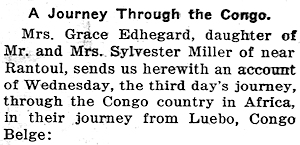
Newspaper article from The Miami Republican
of Paola, Kansas printed May 17, 1918. - Click to see entire article.
|

A Journey Through the Congo.
Written by Grace E. Miller Edhegard
We are awakened rather early by the cook, preparing breakfast on the fire outside our room, rather our house, so we hurriedly dress ourselves. In a short time the boxmen get the trunks and boxes and start on ahead. We are glad for them to do this, for they cannot travel so fast as the hammock men, for their boxes never walk up or down the hills and they find some very difficult places in the path. If they go on ahead then we feel that even though we pass them later, they will at least arrive at the next stop an hour or so behind us. We start out when breakfast is finished while it is yet quite cool, and the men are anxious to go as fast as possible before the heat of the day, so we move on quite briskly.
The path now is becoming quite narrow, winding in and out among the trees, shrubs and hills. I see that it is almost impossible to travel with the shade fastened over my hammock, for it extends out on each side too far when the path is so filled with bushes and the trees' overhanging branches are so low, so we leave the frame behind, taking only the cloth which covered it. The hammock men protest against this, because they say such sunny path lies before us the next day. As we go farther on the people become more uncivilized in their dress. Not that they wear civilized clothes in any place, but around a mission station they usually wear more cloth than in other places. The children go entirely without clothes excepting those who are more fortunate and possess a string, which they tie around the waist, then they are in full dress. The older ones in many cases have only a piece of cloth perhaps a foot square, which hangs on a string at the front of the body, and perhaps another similar one at the back. Of course they have become accustomed to their clothes and feel quite at home, even though a crowd of people are passing by.
It is a great pleasure to them to join the throng and race by the side of the hammock for a long time, gazing curiously upon you. Sometimes at first I felt rather timid at being the object of so much curiosity and so many queer remarks, but I became quite accustomed to it before the journey was complete. They cannot be blamed because they are curious, for they seldom see a white person, and a white woman is a real curiosity. Her hair is so queer and she wears such strange clothes and she walks with her husband as though she, too, were a "mukelenge" or chief. One remarkable thing to the natives is the fact that a white man helps his wife up the hills instead of giving her his load to carry. It seems so strange to them that a white man should do the heavy part of the work instead of the woman doing it. We pass through many villages and find an excited and interested crowd in each one. The sun has become quite hot by this time and it is nearing the hour when one feels the need of some food, so we pass out of the village into a quiet shady place, and while the men hunt something to eat in the village behind, we proceed to enjoy a little lunch prepared that morning for just such an emergency. It is so nice to sit in the cool forest away from the crowd of people, but it is not far enough away, for before we have finished our lunch the people began to come to gaze upon us again. They think it is queer that we eat eggs with salt, and grapefruit is a queer food for human beings to eat. These white creatures eat food that gives no strength and then they must eat again in a short time. But if a little bit of food is given them they carefully divide it among themselves, that each one may have a taste. It is fortunate that these people find it possible to live on the simple foods they are able to grow in this country, for they have nothing to buy with and no place at which to buy. In some parts of the country they are able to raise rice and in other parts potatoes. In fact, they have a kind of sweet potatoes that is quite common over the country.
When we have waited long enough for the men to have found their food, we blow a whistle and in a short time we are again on our way, up and down hill, across streams and short stretches of rather level country. We shall all be glad when the village is reached, for the sun beats down upon us and we wonder what other place in all the wide world has such a powerful sun as our Congo country. About 3:30 we reach our destination and are welcomed by the mission evangelist, who immediately turns over his house to us. The chief of the village calls the women of the town and orders them to prepare bidia for our caravan, and we proceed to make ourselves at home in spite of the crowd that increases instead of diminishing. The evangelist's wife makes us some very nice bidia and cooks us a chicken in some palm oil. We sit down at a little table in front of our house. It is not large enough inside for our camp beds and a table, too, and besides it is much more pleasant to eat in an open place where there is plenty of fresh air, for in the house it is so stuffy. There is only one small door and no windows in the house and it is impossible to obtain good ventilation. The natives think it is a funny sight to see us eating their kind of food and are very much interested to know if we really like it. After supper is finished we sit down to read, but do not accomplish much, so, we take a little walk and come back. The most profitable things, it seems, is to make what preparations are necessary for the morrow's journey and go to bed. This done, we retire and are soon lost in the land of dreams.
Grace Edhegard.
Grace says the trip took ten days. Some of her letters about the trip may have been missing.

A Journey Through the Congo.
Traveling in Africa - Day 4
Written by Grace E. Miller Edhegard
Newspaper article from The Miami Republican
of Paola, Kansas printed June 21, 1918.
|
We herewith present the account of the fourth day's journey of Mr. and Mrs. Edhegard in their trip in Africa. It will be remembered we have published several very interesting letters from Mrs. Edhegard, daughter of Mr. and Mrs. Sylvester Miller of near Rantoul, who went to Africa several years ago as a medical missionary. Her last letter was posted March 5 and was received June 10, and is as follows:
|
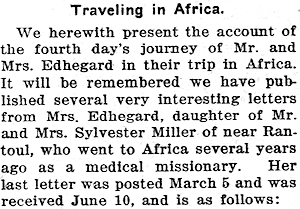
Newspaper article from The Miami Republican
of Paola, Kansas printed June 21, 1918. - Click to see entire article.
|

Africa, March 5, 1918.
Traveling in Africa.
Written by Grace E. Miller Edhegard
Morning has finally come again and it is time to start out once more. How good it will be to locate in a place where we can stay more than a few hours and have an opportunity to think.
I have not mentioned the cat lately, but he is still with us and despises this life more than I can tell. From the time we start in the early morning until stopping time at night he cries and cries, but when taken from his basket at night seems to be satisfied as long as we are near him. He is afraid of the natives, so we must keep him tied to keep him from running away when they make so much noise.
We start out once more and everything goes on as usual. We pass village after village, all having much the same appearance. In this part of the country all the houses are about the same size, varying a little. I think if I were living in one of them I should be compelled to put my name or some mark on it somewhere so I would not make a mistake and live in the wrong place. The people worry little about their dwellings and it takes little money to provide a house which they consider meets all their requirements. In fact, all that is necessary is to exert themselves enough to collect the material used in such a structure and proceed to construct the house. The country provides everything necessary. They put the sticks or poles upright in the ground the size of the house which they plan. These are tied together with creepers and all the cracks plastered with mud. The roof of course has the central pole, with poles extending down to the sides of the house and this is covered with thick layers of grass, which keeps out the rain and the strong rays of the tropical sun. A little hole is left somewhere about the building which they call a door. Some of these openings are just large enough to permit them to crawl into the house on hands and knees, but then such a small hole is not so hard to close up and keep out wild beasts and fresh air. These houses are about eight by ten feet and many people can crowd into them and lie around the fire and feel that they have all that they need. How easily satisfied people can be until they know that there is something better for them, but even then many of them as the American Indians in the earlier days after being in school, accustomed to civilized ways, return to their former habits, so these people after working among civilized people and seeing better ways are content to continue in the way their fathers and their fathers' fathers before them have gone for years and years and years.
It seems to me the sun is hotter today than any day we have been in the path during this journey. We stop about three o'clock and we try to find a comfortable place in the shade of the house until it is finally turned over to us. But it is too warm inside, so we spend most of the time outside until bedtime and that comes at no late hour for me when on the road. We are too exhausted to even wish the crowds would disperse; they are always so curious and interested. We wonder where the cook is keeping himself. We finally learn that he through some misunderstanding has gone far on ahead and we shall probably not see him before tomorrow. Well, the cooking is not a very difficult proposition now, so with the help of a younger boy we soon have supper and set about to arrange things for the night. This is the smallest house we have had, but manage to get both cots into it and still leave a little space at the foot for a trunk. After we finish supper we read aloud from a book and the natives think this a strange affair, especially when we come to something amusing and indulge in a good laugh. Not having books of their own, they do not understand what can be on that paper that would cause a person to act so ridiculously.
These are queer people whom we are among, easily influenced but so easily turned some other way if opportunity is presented. Many times so true to their convictions that they suffer imprisonment and death rather than turn aside from what to them seems the right course. They become attached to the white people in many instances, and when they go away do not forget them, but when they return consider it their privilege and duty to come back and take up their former work, in many cases leaving a salary double as much as the missionary can afford to give.
When we have finished reading we sit awhile in the beautiful moonlight. Perhaps you have read of the moonlight nights of Africa. The moonlight is really wonderful beyond description, so light many times that you can read a short note or a little in a paper. Of course it would be very unwise to use the eyes for such purposes to any extent just for the sake of reading by the light of the moon. How I wish we could lend you at least one night of this radiant moonlight nights of Africa.
Well, I must say good-night, for we are both tired from the journey, and you know, people in this country require more sleep than the same people would require in their home land.
Grace Edhegard.
Grace says the trip took ten days. Some of her letters about the trip may have been missing.

A Journey Through the Congo.
Traveling in Africa - Day 5
Written by Grace E. Miller Edhegard
Newspaper article from The Miami Republican
of Paola, Kansas printed August 2, 1918.
|
Mrs. Grace Edhegard, daughter of Mr. and Mrs. Sylvester Miller of near Rantoul, a medical missionary in Africa, sends us the account of Friday, the fifth day of their journey, which is a continuation of her interesting letters heretofore published. She writes:
|

Newspaper article from The Miami Republican
of Paola, Kansas printed August 2, 1918. - Click to see entire article.
|

Through African Jungles.
Written by Grace E. Miller Edhegard
This day is destined to be one of the longest we have seen so far in our African experience. We are awakened early in the morning by the men who are thinking it is time to start, but it is far from that hour. We settle down to peace and quiet, but it does not last long, for they feel they must be up and get ready, and so by the time we are dressed a little food is ready for us and in a short time we are off again. We travel hard these first hours of the morning, for it is cool and we want to go as far as possible before it is impossible to make rapid progress.
We see many kinds of trees and plants in the woods, some very tall trees with vines hanging down from them until the undergrowth is very dense and thick and affords a good hiding place for man and beast. What slow traveling it would be if we had no path and had the task to make one through this thick growth. There are many ferns and pretty shrubs by the path. Such delicate feathery leaves you would expect to see only in a place where they are cared for most tenderly. These refuse to grow when removed to a civilized place and given careful attention. How much I wished for some of them as plants for our new home. They would make the most magnificent hanging baskets you could imagine. Then we saw some trees that were as pretty as flowers. They look from a distance like a huge bouquet of variegated posies. The leaves were beautifully shaded, being dark red nearer the ground, but as they reached some height lighter and lighter until the tops looked to be almost a soft grayish tinge. It was one of the most striking trees I have ever seen and we planned to get a small one to start on the new station, but the men said we would see more when we were near our journey's end, but I am still regretting that we failed to get one of the small plants or any of the seeds. We tried some of the ferns later, but they all died even before we reached our destination. We enjoyed seeing the different species of plant life in the forest and the path was well shaded, so traveling was really pleasant. I felt many times it would not have been dangerous to take off our helmets, but this tropical sun is never to be trusted or risked, so we refrained from doing so.
To-day is very much as all the other days so far. Walking up and down the hills takes more time than covering the distance between them, for they are all so dreadfully long. I wonder sometimes if is going to be possible to hold out until the top is reached and when you finally live through and arrive at the goal, behold, just ahead you see another that looks longer and steeper than the one you have just conquered.
The path winds in and out and you do not longer wonder how the "Babes in the Woods" felt as they walked and walked and walked, but never came out of that big, dark forest. Everything is so quiet that you meditate on the wonders of nature and the bigness of this old world. What a marvelous work was that of the creation of this universe!
For some distance to-day our path lay in the middle of a small stream. The men seemed to enjoy this, since they were barefooted and like water on their feet. They are more particular about keeping their feet clean than many people are about keeping their hands clean. I think perhaps the reason for this is because the jiggers do not like water. These jiggers are not what many people at home call jiggers, which should be called chiggers. These are really jiggers and they dig their way into the flesh, usually of the feet, and sometimes a white person is unfortunate enough to get some. They make their home just under the skin. Here they form a bag, which grows as large as a pea and this is filled with eggs, which in appearance look much like spider eggs. If the jigger is not removed before this stage is reached or soon after, the bag bursts and also the skin over it and the eggs are scattered everywhere, ready to hatch and crawl into the feet of another poor creature. These little insects make very bad sores on the feet of the native, and many times the children are so infected as to lose some toes and they suffer greatly from the invasion of these pests. The little children are not to be blamed, but those who care for them, but the grown people do not deserve pity if they are too indolent to remove them after they are discovered. One is usually able to tell shortly after one has taken up his abode in your flesh, because it causes a terrible itching. (Yes, I speak from experience, and I think all the other missionaries could also.) Excuse this digression, but I just got off the main subject a little.
We have traveled a long time, for it is nearly three o'clock, so we stop in the village really intending to pass the night there, for by the time we can get something to eat it will be a little late to start out again. But the men get up a discussion and declare if we go on we shall be able to reach Mutoto, the mission station, by 8 o'clock. Well, we think it is foolish to spend another night in a little native hut if we can reach the end of the road so soon, so about four o'clock we start out once more. We leave the caravan to follow the next day, as we do not expect to need anything more to eat or beds upon which to sleep before we reach the station. But alas, we are rewarded for taking the word of a native whom it comes to measuring distance. They will usually say there are only so many streams to cross, or so many hills to climb, but many times the hills or streams or villages are two or three hours apart. Often one is impressed to believe that a place is only a short distance, when in reality it is a good day's journey away for a white person. And so we found it this day.
After going on for some time we cross a footbridge, which made me wonder if it would hold together until I was on the other side of the stream. I am happy to say it did. But did you ever in all your life see such a hill! It went straight up into the air, yes, honest, it was as straight up into the air as a path could go, I think, for we had to pull ourselves up a little by little, by the roots and shrubbery in or near the supposed path. It was every one for himself, equal suffrage. Well, we rested awhile when this feat was accomplished and almost felt heroic. Perhaps we shall feel more heroic by the time we reach Mutoto.
Well, we go on, on, on. Shall we ever reach a stopping place? The men say only a few more hills ahead, or just on the other side of the next village. But where is that next village? I thought if there were many more of these small mountains I would never be able to climb them and I was ashamed to ride in the hammock, for the poor men were as tired as could be, but then I almost felt it was good enough for them, for why did they say it was only a couple of hours farther on. Fortunately the moon came up soon and it was almost as light as day and cool, so we seemed to get fresh courage and strength and travel quite briskly between the mounds.
It is now getting well toward midnight, so I suppose I should start the account of another day, but since we reach the resting place and shall remain there for several days, I think best just to conclude this part of the journey in the account of this fifth day. After traveling for some time the men want to stop at a large village and spend the night, but it is too late for them to put up this plea, for all our things are behind and so we ask them where we should sleep. They are not convinced but think we should stay, although we are convinced that we should go on now until we finally reach the station even if it should be noon the next day, for we are too tired and hungry to think of sitting down and simply waiting for time to pass. Of course the men would be glad to lie down on the ground and sleep, and think they had a good bed, for that is as good as most of them are accustomed to have. I must say I have not yet become so naturalized.
Onward we go and after awhile we are happy to see signs of civilization. As we start up a long hill we notice banana plants and other signs of a garden, so we are convinced this time that the men are speaking the truth when they say the village is on the top of the hill. When we enter the little town the men are anxious to sing their hammock songs, but as these are always lively and noisy we feel that it is more of an injustice to the sleeping people to be awakened from sleep at one o'clock in the morning than it is to refuse the men the joy they might get in indulging in this custom. They consider it a great honor to enter a village with noise and song.
How good it did seem to see the missionaries and to have a chance to go to bed and have a good rest after the long tiresome day. It was about two or perhaps a little after when we retired and it was nearly twelve when we again recovered consciousness. We recovered gloriously and are still alive to-day.
Grace Edhegard.
Grace says the trip took ten days. Some of her letters about the trip may have been missing.

About an African Baby.
Newspaper article from The Miami Republican
of Paola, Kansas printed August 16, 1918.
|
Rantoul, Kas., Aug. 7, 1918.
Editor of The Miami Republican:
Dear Sir: We are in receipt of a letter from our daughter and husband, Mr. and Mrs. Edhegard, in Africa, dated May 10, 1918, announcing the birth of their son, May 3d. The mother says Junior has black hair and blue eyes, and adds that likely in time will develop into a full fledged Swede. The father also wondered what nationality his little son would be with an American mother, a Swede father and born in Africa. They also wish to thank all those contributing to the goods started from here October 1, 1917. They came to them the last of April, 1918, being shipped with an order from Kansas City. They feel very grateful to everyone, making mention of the nice new silky table cover, dress goods, towels, etc.
Yours truly,
Sylvester and Anna Miller.
|
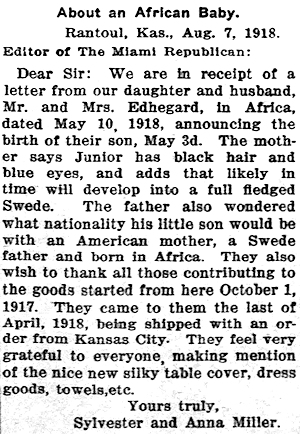
Newspaper article from The Miami Republican
of Paola, Kansas printed August 16, 1918. - Click to see entire article.
|

From South Africa.
Written by Grace E. Miller Edhegard
Newspaper article from The Miami Republican
of Paola, Kansas printed October 18, 1918.
|
Mr. and Mrs. Sylvester Miller of Rantoul recently received a letter from their daughter, Mrs. Grace Edghegard, who is a medical missionary in South Africa, which we publish herewith, together with a postscript by Mr. and Mrs. Miller:
|
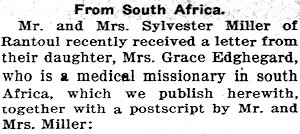
Newspaper article from The Miami Republican
of Paola, Kansas printed October 18, 1918. - Click to see entire article.
|

June 5, 1918.
From South Africa.
Written by Grace E. Miller Edhegard
Dear Ones at Home: It has been months since I've had word from any of you, and I am certainly anxious to hear. We have decided to have you send our mail to the address below: A. P. C. M. Bibanga Kabinda, Congo Belge, Via Cape Town, South Africa. By this route we will perhaps receive all mail intended for Edhegard's.
|
We are all well again. Sixten had a fever, but is getting well. He was quite sick for several days. Junior is doing splendidly now. We have a picture of him when he was twelve days old, so you can get a faint idea of your handsome near (but far) relative. Really he is a good looking laddie. We are planning to move to Mutoto in about three weeks. It will be a very hard, tiresome and slow trip.
|
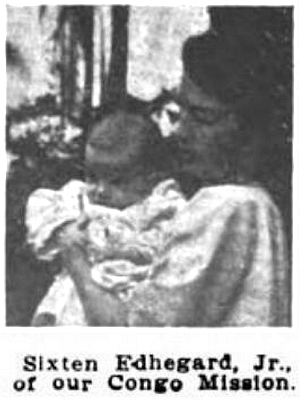
Grace and Sixten Jr, 1918.
|
We are anxious to go, as the mosquitoes are not so bad there, we have been told, and also we shall have a more comfortable house, not a mansion with all modern improvements - or even a cottage, but made of mud, sticks, etc., but it will be home. There is a new mud house almost finished here, which will be quite comfortable and pleasant. The eagles and hawks have been so bad here that the chicken business is not very successful. The eagles carried off two of my hens that had little chickens.
June 8. This did not get started yesterday and the mail came bringing a card from Henry written in November, but nothing from home. Sixten received a few papers but I did not get a single one. If this letter takes as long to reach you as return mail here, then I had better wish you a Merry Christmas. I wonder if Francis is married? How Grandpa is getting along? If Aunt Nettie is well? If Fred is still on the route, and how the babies are? If Willie's new house is finished? If Ethel has success with her bread making? If mother is well and happy? If Sunday school is still going on at the Ridge? How everyone is in the neighborhood, big and little, old and young? Who has gone to war, and just lots of things? These are perilous and terrible times, and it makes us think the time of our Lord's return must be near. O, that we may be found ready when He appears.
Much love from Sixten and Grace Miller Edhegard.

P. S. The above questions have been answered and sent to daughter many times, but unfortunately failed to reach them, but they think the change in address will be more sure of reaching them. Would all those interested send a Christmas card, mailing them not later than October 18. Several cards can be enclosed in one envelope, and be more sure of delivery.
Anna and Sylvester Miller.

From Far Away Africa.
Written by Grace E. Miller Edhegard
Newspaper article from The Miami Republican
of Paola, Kansas printed December 27, 1918.
|
We have the privilege of presenting our readers this week another very interesting letter from our good correspondent in Africa, Mrs. Grace Edhegard. During the past several years we have published a number of interesting letters from her, the last five or six being serial letters descriptive of their journey through the Congo jungles, going from one mission to another far away mission. This letter is descriptive of their journey the first day of the second week on this trip. Mrs. Edhegard is a daughter of Mr. and Mrs. Sylvester Miller of near Rantoul, and went to Africa as a medical missionary. She was married there to Mr. Edhegard, a Swedish missionary, and now there is a new little Edhegard, as will be seen by this letter. All of our readers, we are sure, will congratulate the happy parents on this great event in their lives, although the little chap is now nearly eight months old, having been born last May. But news travels slowly from Africa to Paola, so we may all be pardoned for sending our good wishes at so late a date.
Mrs. Edhegard's letter follows:
|
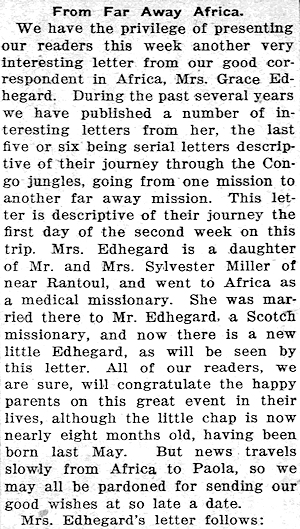
Newspaper article from The Miami Republican
of Paola, Kansas printed December 27, 1918. - Click to see entire article.
|

Mutoto, Aug. 5, 1918.
To the Editor of the Miami Republican:
Dear Friend: Thank you so much for the paper. I last week received a package containing four. These were the first papers I have had from U. S. A. this year.
We are pleased to announce to you the birth of our son on May 3d, weight 7 pounds. He hopes to visit America next year by this time.
Our mail will be more likely to reach us if addressed to: Kabinda, Congo Belge, via Cape Town, care of A. P. C. M.
Respectfully yours,
Grace Edhegard.

Monday, August 13, 1918.
From Far Away Africa.
Written by Grace E. Miller Edhegard
Now, do you not think that the thirteenth is a fine day to start upon a journey? If it were only Friday besides, we could expect nothing but the best of luck, could we? Well, the day of belief that the thirteenth is unlucky, is, I believe, confined mostly to those who refuse to throw off that superstition, so we pay no attention to that but go on our way rejoicing.
I know when we awoke this morning we felt the spirit of travel in our veins, for it seemed we were already almost upon our way. I am sure the cat did, for he tried to run away again, and in spite of petting and coaxing seemed uneasy, as though he had understood when we told the men the day before that we would start about nine o'clock Monday. We did not let him escape us that time, and had a more comfortable basket arranged, which we tied on the hammock pole, where we could see to his comfort.
It was nearly ten when everything was in readiness again and we were once more "traveling in Congo." It is difficult to get away from a station early in the morning, for you must bid everybody good-bye, and that takes more time than one would think. For my part I always wish people would not tell me good-bye just at the time of starting, but give me all the good wishes the day before, and say, "We know you will be busy in the morning, so we shall not see you again." That would spread the good-bye over a longer period of time and would not be so hard on the nerves. You would also be able to get an early start and be saved some exposure to a burning tropical sun. But this is not the custom of the human race, for it always postpones such things until the last moment, and the depression of the good-bye weighs heavily upon those who go as well as upon those who stay. Show me the man who chooses his sorrows now rather than after awhile, and I would see something one does not meet with every day. Our hearts do not easily choose suffering.
The village at which we are to spend the night is about seven hours away. That means seven hours of steady traveling, so we shall probably be able to reach it just before dark. It is not the time of the beautiful moonlight nights now, so we must plan to reach all places at which we are to spend the night before the darkness overtakes us, for it would be almost impossible to travel in the darkness. The men are much afraid now after the sun goes down, because the leopards infest this part of the country. They can not be blamed, for I am quite certain none of us would contemplate with pleasure meeting face to face a big leopard even in broad daylight, but how much more horror is lent to the situation by the darkness. All our boxes started this morning on ahead, so we feel confident of something to eat when we stop for the night. Perhaps you recall the fact that we were unfortunate enough to be left without food the first day of our first week of travel.
It is very interesting going over a country when you have never been that way before, for you are constantly wondering what lies before you and what new thing will next appear. Well, it was not a new thing which appeared to us just as we left this first village. Do you think you could guess what it was? Nothing at all dangerous, just one of our old friends, and we are to meet many of them, a hill. Before we have gone an hour and a half we have met twelve of these friends. Yes, honestly, I counted them, for I thought it would be interesting to know how many there were, but I grew weary of such monotonous work and besides, when you count your troubles, they always seem so much greater, so I decided to just forget. My husband was about as cheerful over the hills as I was and he wonders if they will ever end. I tell him they will end when the war does, but I expect they will last even longer than that.
We proceed on our hills until a little past one o'clock, then decide it is time to have a lunch, so while the men bathe in a stream just behind us, we sit in the shade nearby and enjoy some sandwiches. All about us are the prettiest ferns I ever saw, so feathery, with a bluish tinge to them. After a short rest we feel better and stronger for whatever may be lying before us, so we start out once more, thinking that to-morrow we shall not only miss the hills but also the nice shady woods and cool streams. How the men do enjoy the streams, and I almost envy them sometimes and wish I could be a child for just a little while and wade around in that nice, clear, cool water. Although grown, the adults are so much like children that one almost forgets his years and supposed dignity in mingling with them. In most every way they reason as children, and it is difficult to make a contract with them, for they do not seem to realize that a thing can be settled once for all. In their troubles which are to be settled they will go back for years and years, over relations existing between themselves and the other party concerned and relate every detail as though it was of the utmost importance. But one must learn patience, for an improvement can be seen in those who have been associated with the mission people. Not in all of them, for I could not say that truthfully, but in many of them.
The villages are almost the same as I have described before, with their little mud houses and people crowding around to see something that is different than they have been used to all their lives. The houses, however, are smaller and shabbier, for this tribe is a lazy and shiftless people and would rather live in almost any kind of shelter than make exertion enough to make a good house.
What is that strange noise we hear ahead of us in the distance? It sounds like a motorcycle, but that can not be possible, for we are sure there are none in this part of the country, and if there were we would probably have heard of it before this time. We inquire and the natives tell us it is a place where they are making iron. Well, that is something new for us to see, and we had not heard of it before. When we reach the village we stop to see the source of the noise. It is easily found and the natives seem glad to show us something in which we manifest interest. We enter a dark hot shed, in the center of which is a cone shaped furnace-like place containing fire, and behind this are two men blowing bellows which connect with the inside of the cone and into the fire place. They have their rocks in this furnace and it becomes so hot they melt, and the people from this material make knives and axes of their own. This arrangement shows more thought and reason than any work I have heard of in this part of the country. We thank them for their information and start again on our way, but we do not go far before we hear similar noises and come upon another iron-factory.
The farther and farther we go the more curious the people seem to see us and whatever we may have with us. When we finally reach our destination for the night we have quite an audience. They crowd around us until it is almost impossible to be able to get a breath of fresh air. As we traveled faster than our box men, we must now wait for them before we can get our supper. It is always a relief to see the native evangelist and his wife, for usually they have so much more common sense than the rest. That speaks well for the effect of a Christian life. At this village the evangelist's wife met us quite a distance from the village and now she brings us nice, cool spring water and half a dozen eggs. In a short time our boxes arrive and we have supper and prepare a lunch for use in the path the next day. Now we are ready to go into the house, when the evangelist comes to tell us we must put everything into the house, because the people, as he expresses it, are real heathen and will steal everything they can. A sentry usually sleeps so soundly that thieves could almost take the house before his slumbers would be disturbed, unless he is especially on the alert for fear of wild animals. At this place they were all afraid to act sentry, for they said they feared the leopards. Finally everything is put into a safe place, the cat fed and made comfortable for the night. We read a little, dismiss all troubled thoughts and lie down upon our beds for a much needed sleep. I think one tires more with less exertion in this climate than at home. I know many people have said more sleep is needed, and as far as I am concerned I have found this to be the case. At last the noise stops and we go to sleep, feeling that there is One who neither slumbers nor sleeps, who keeps watch and will not let harm befall us.
Grace Miller Edhegard.

A Little African Baby.
Newspaper article from The Miami Republican
of Paola, Kansas printed January, 10, 1919.
|
Not an African baby as we know them, but a white baby born in the Congo country, in central Africa. That is whom this story is about. Our readers have read and remember with much pleasure the good letters that have been sent us from Africa by Mrs. Grace Miller Edhegard, daughter of Mr. and Mrs. Sylvester Miller of Rantoul, who went to Africa as a medical missionary. She was married in Africa to Mr. Edhegard, and her accounts of their trip through jungles to another part of the Congo have been read with much interest. Their son, Sixten Edhegard Jr., was born May 3, just six weeks before they set out on their journey, and the following letter is the baby's own account of his experiences, etc., on this journey, written under the heading "My Trials and Tribulations in Traveling:"
|
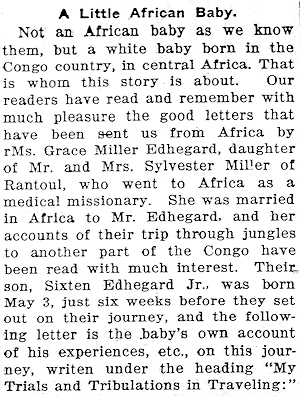
Newspaper article from The Miami Republican
of Paola, Kansas printed January, 10, 1919. - Click to see entire article.
|

My Trials and Tribulations in Traveling
Written by Grace E. Miller Edhegard
in the voice of her baby
Do you know the funniest thing happened to me. I do not understand it at all, but before I tell you about it I must tell you a little about myself, so you will know what I am trying to talk about.
|
The first I remember was opening my eyes in a little grass house. It was such a funny, dark place, that I just cried real hard, and loud, and the big people who were there only laughed at me, but I did not see anything to laugh about. Someone dressed me and put me in a basket, and I went to sleep. I slept a long, long time, for I was weary, and when I awoke they gave me something to eat. I was not hungry, but they insisted, so I tried to please them, but I just could not keep my eyes open, so they let me go back to sleep.
|

Grace and Sixten Jr, 1918.
|
As the days passed my father and mother would talk to me and tell me that I must eat plenty and sleep plenty and grow quickly, for we must soon go on a long journey. I did not know what a journey was, but thought it must be all right, for they seemed to try to give me everything that they thought good for me. Well, I stayed in a basket most of the time. It had some kind of a covering over the top. I disliked this thing over me, because I could not see so well with it there, but I learned afterwards that it was a good thing I had it, for little bugs, called mosquitos, were as thick as bees in a hive and they would have probably finished me, and I would not have been here to tell you about it. I grew stronger rapidly, and my parents began to send our things away, and our little hut looked large, because it was so empty, but we did not stay long after that.
They stirred me up early one morning, tied my basket to a pole under some kind of a cover, and put me inside. Mother stayed with me, so I did not worry much. Then they commenced to move with me. At first it was rather pleasant. I had always wanted to be carried around, but my mother did not agree with my idea, as she thought I ought to be kept quiet so I could sleep and grow. I believe now that was the best. They shook me, and shook me, and I was so tired I just did not know what to do.
The first morning we went only a couple of hours and stopped. I had never heard so much noise before. Black people came by the hundreds, when they heard there was a white baby boy in the big basket. They had never seen one before, and they certainly acted that way. Don't you know I felt like I believe the animals in a circus must feel. Those people came putting their black faces close to my basket until I thought that it must be about all the people in the world. We went into a house, but as I was a little white chief, those folks could not follow, but they looked through the doors and windows. I finally managed to get a short nap, and a little while after we started off again. They had just rested until the sun should not be so warm for me. They ought to have known I would rather jog along than lie in a basket with a million black people staring at and talking about me. Then, too, I at first enjoyed that motion, but soon found it was not so nice. The black men who were carrying us went so fast and bounced me so much that I just could not see, and I was so hungry. Mother thought it would not do me much good to eat, because when they shook me I would just be churned. It is a wonder they did not make butter in me, and I expect they would have, but when they jogged me extra hard, I just had to spit the milk out. Of course I felt fine after having a good meal, but it surely did make me sorry to lose it like that, and I felt rather empty, too. We stopped some time after dark, and I had supper and went to sleep. I certainly did sleep some, and just remember waking up for something to eat and going back to sleep again.
The next thing I knew, I was moving along and had been for several hours. I thought I dreamed about crossing a river, but I heard them talking afterwards about having to wait so long for the boats to come, and them they were such little hollow logs, that only a few people could ride at the same time. It must have been dangerous, for they were so particular to have some one watch my basket carefully. It probably was fortunate that I thought I was only dreaming, or there might have been some wiggling done and it would have been rather early in the morning to have a bath in the river along with the crocodiles.
My trials this day were the hardest I had ever known, but then you see I was only seven weeks old. The people were all the time just crazy to see me, and ran along beside my hammock making so much racket I would have been dreadfully frightened had not mother or father always stayed with me. The dust was so thick I nearly smothered and it made me so dirty. My hands looked so black inside that I wondered if I would soon be the same color of the people who were always trying to see me because I was a white boy. My folks do not seem to think it is so funny I am white. We went through many villages and in every one there were many of these black men and women. Some of the towns were very large and it took us a long time to go through, and by the time we had reached the last house we had most of the people following us shouting and jumping and singing. There was plenty of excitement. At last we stopped at a big house in the middle of a village. I was too tired and dirty to sleep, so I made a plenty of noise, almost as much as the natives had made in the path. I know my parents were tired, too, but they could walk around and wash themselves and I just had to stay in one place. Our camp things did not come for a long time, so we all lay down on a mat on the ground. Father and mother had been awake since two o'clock, so they were sleepy, too. I said we lay down on the ground, because ground is the kind of floors they have in these houses. We have that kind also, but there is something else on top. I had my quilt under me, and when the folks stayed with me I went to sleep. It was about dark before my bath things came, but that bath made me feel like a white baby again. It made me sleep fine.
I was ready to start early the next morning. We walked awhile and soon came to a long hill. I was really afraid to squirm for fear mother would fall down with me, and I know that would be just about all I could stand. The bottom was safely reached and I breathed more freely. The hammock men wanted us to ride, because it was nice and cool and they wanted to go as fast as they could before the sun was high, so we did as they wished. We went right along and left father far behind. He had to see to the people who were carrying the boxes so they would not stay in some village and waste time and come so late to our stopping place. I slept a little, as it was cool, and I had been awake since early in the morning. When I opened my eyes the sun was very bright and it was getting real warm. We stopped in a little village to wait for father, and how the people did crowd around me. We sat on the veranda of the evangelist's house and I could scarcely breathe on account of the crowd. They wondered what I ate, and discussed what I wore, and where I slept, until I decided I must be quite a wonderful person, and I could not understand why I did not get something to eat if I were such an important baby. I finally succeeded in convincing mother that it was absolutely necessary that I should have some food and we went into a tiny, dark house and had some refreshments. That gave me fresh courage, so we started out as soon as father came. In a little while we reached what they called a river. This was the first I had ever seen, as I was so sleepy before that I could not see when we crossed the other one. It was about the hottest place I had been in, for it seemed the sun was as hot shining from the water as the one shining down, I was glad when we had crossed. After that we went along real fast. We soon reached the house where we were to stay, and it was the biggest house I had ever been in. There was only one room, but it was so long I was almost afraid when I was put in my basket at one end of it and then my parents went to the other end. You must remember I was born in a tiny grass house. Sometimes I wondered why my father did not break his head on the roof, but he seemed to know where he could stand straight up and where he had to stoop.
I did not like this big long house very well, for I was lonesome when left alone. I yelled until I found it did no good, then I went to sleep. The water in this village was as black as coffee, at least that is what I heard someone say. I know I did not have my usual warm bath, but a new kind in olive oil. That was not so bad and I felt fairly well after it. Usually I go to sleep as soon as it is dark, so I was soon lost to the noise and the chatter of the people.
I slept until a little after three o'clock and we started out again. What did it all mean? Why did we just keep going to a new place every day when it was so much more pleasant to stay at home. They said we had a big plain before us which we must cross before dark. Judging from the time we started that morning I think it must have been a tremendous one. I did not care what it was for. I was so tired. I cried, for they shook me to pieces and I thought my head would come off. Mother put her hand on my chest and tried to hold me quiet, but that was not possible, so she took me in her arms. I liked that better, because I could see around, but after all there was not much to see. Nothing but little short grass and weeds and tiny gnarled trees. I did not want to stay in the basket at all, so I made plenty of objection to being put back. I was too worn out to be a good baby longer.
After traveling a long time we saw something far ahead of us which they said was water. We reached it at last and ran along beside it for some time. It seemed hours to me but the men said it was in sight about one and a half hours. It was a very pretty place and I would like to have stayed, but we went on. I was getting real restless when we reached the village, and I think everybody was glad, for I must have been hard to hold when I kicked so much. Didn't you ever get so tired you did not care what happened? I know I love my father and mother as well as any other little boy, but I behaved badly that evening. I finally quieted down and they told me afterwards that while I slept the chief of the village came to see me. They told him he could come when I woke up. You see they did not disturb me for a chief. He did not look like a very important person when I at last consented to see him. He did not have very nice houses in his village either.
The last day was the worst. There were so many hills and mother had to walk so much of the time. I stayed in the basket, as I was so little they could carry me all right. Most of the time I could see no one but the black men, and I did not like that. They were always good to me and so particular when they were in a bad road. One time they crossed a bridge made of sticks and grass. Two of them stepped on the same stick and it broke. The man who was keeping my basket level fell into the water, but he just stretched his arm up and kept me from tipping the least bit.
Once when we were passing through a village the people swarmed around us. The men think it is quite an honor to carry us white folks, so some of the village folks took the hammock and commenced singing and dancing. The women and children crowded around and all of them made the worst music you ever heard. I was dreadfully frightened. I must have looked queer, for I know mother told our hammock men to carry us and get out of that place in a hurry and never let strangers have the hammock again. The men thought they could rest a little while, but they did not have very hard work to carry us, because there were ten of them. They were big, strong fellows, too.
|
I was very happy to think that this was the last day I was to be a traveler, because I had about reached the end of my patience and was getting a bad disposition. I went to sleep just before we reached the village, and when I awoke I saw some strange white people, so I knew we were there at last.
I had some trouble settling down to a quiet life again, but I am happy now to give up the life of the road and stay at home. I lie on my bed on the veranda and wonder many times why we ever took all those rides, and if we shall have to do so again some time. I hope not.
Many regards to you all.
Sincerely yours,
Sixten Edhegard Jr.
|
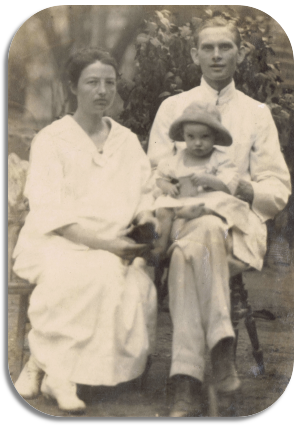
Grace, Jr, and Sixten, 1918.
From the Esther Smith Album.
|

Perhaps this may interest children. This baby was born May 3, 1918, and made this long journey when only seven weeks old. He stood the trip fine, but it was very hard and dangerous, too, on account of the sun.
Respectfully,
Grace Edhegard.
Nils Sixten Edhegard Jr. was born May 3, 1918 in Bibanga, West Kasai, Congo, Africa.
The editor above, said the baby was six weeks old when this journey began, but Grace said her baby was seven weeks old. This would have placed the date of the trip on or after June 21, 1918.
This journey would have been from his place of birth to Mutoto, Congo where the family lived until their furlough back to America, just as the Spanish flu was also traveling around the globe.

The articles that are printed after this are not written by Grace or Sixten Edhegard, but by other missionaries who worked with the Edhegards. They give insight to the missionary stations and their living conditions.

Foreign Missions
Written by Rev. A. C. McKinnon
ANNUAL REPORT TO THE AFRICAN MISSION.
Rev. A. C. McKinnon.
Magazine article from The Missionary Survey printed April 1918.
Published monthly by the Presbyterian Committee of Publication, Richmond, Virginia
|
YOUR Congo Mission has finished another
year of service for the Master
in this dark land, and we come now
to the pleasant task of making known to
you how ihe Holy Spirit has prospered us.
Our report for 1916 showed the largest ingathering
of any year in the history of the
mission. 1917 shows a still larger number
added to our roll than were added last year.
We report this year a harvest of 3,161 souls
brought into the kingdom on profession of
faith, and we rejoice to note encouraging
progress along all lines of our mission
work.
|
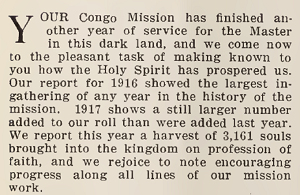
Magazine article from The Missionary Survey printed April 1918. - Click to download entire article in a PDF file.
|
Especially gratifying is the progress that
has been made in the matter of self-support
and self-government. The three native pastors
who were ordained to the full work of
the ministry have done splendid work, and
have fully justified our confidence in them
by their wisdom, their devotion and their
untiring zeal in the work of the Lord.
The general health, of the missionaries
has been, on the whole, very good. We recall
only one case of serious illness during
the year, that of Mr. Stegall, whose life was
despaired of for several days, but was finally
given back to us, as we believe, in answer to
united prayer after medical skill had exhausted
its resources.
Luebo grows more beautiful from year to
year as the old mud buildings give place
to neat brick structures, which also have
the advantage of being permanent. The
well-kept avenues and grassy lawns, with
neatly arranged tropical trees and shrubbery,
over the large compound, speak well
for the aesthetic taste of those who are
responsible for these improvements.
The large native village, with its population
of something like 20,000, has been
laid off into regular streets like a city at.
home, the houses numbered and streets
named. These changes not only add very
greatly to the looks of the village, but also
make it possible to do pastoral work among
the people with system and order. The village
has been divided into three sections
with a large chapel built in each section, and
a missionary is assigned to each of these
divisions as pastor. This plan was made
necessary by the continued growth of the
congregation, which has been for a long
time larger than the seating capacity of
the one large chapel on the compound.
These different sections have been so well
organized under the efficient direction of
Mr. Martin and others that the conduct of
almost every individual Christian is
brought under the scrutiny of some assistant
of the pastor each week. They know
who goes to church and who does not; they
know who gives to the support of the work
and who does not; they know who sends
his children to school and who does not.
and instead of the natives resenting this
kind of oversight they rather appreciate it
as a manifestation of the pastor's interest
in their welfare, before each quarterly
communion the church members are carefully
examined and any who are found to
be shirking or doing anything not in keeping
with Christian conduct are disciplined.
On communion days only professing Christians
are permitted to attend the service,
so that we have no disturbance from uninterested
spectators, and also have plenty
of room for all who have a right to be
present.
Educational Work.
The Industrial School reports the addition
of courses of instruction in shoemaking and
tailoring. This school is sending out boys
with a knowledge of carpentry, bricklaying,
ivory carving, tailoring, shoemaking, etc.,
who, in future years, will do credit to the
institution, as well as help to build up a
self-supporting church. Mr. Stegall has
been enlarging the capacity of the school
as fast as possible and the increased enrollment
grows with the added accommodations.
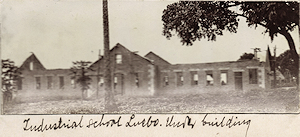
|
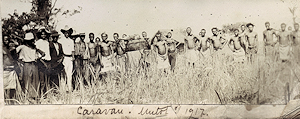
|
|
Industrial school Luebo. Under building.
|
Caravan. Mutoto, 1917
|
The Evangelists' Training School has had
a very successful year. The graduating
class which went out in June numbered
25, while 62 others finished the special course and were sent out to regular evangelistic
work. At present there are 74 in
the preparatory department; 24 in the first
year class; 15 in the second year class and
35 in the third year class, making a total
enrollment of 148. The principal, Mr. Crane,
is planning an extended trip among the out
stations during the month of December to
gather up additional students. In addition
to the regular literary and Bible course all
students are given some instruction in agriculture,
which they are able to pass on to
the natives in the out stations where they
are sent.
The Experimental Farm has come to the
rescue on the food question, so that instead
of suffering from the curtailment of imported
food, we have lived almost as comfortably
as if no shortage had occurred. It
is true that we have felt just a little disconcerted
at times and have had some little
difficulty in always agreeing that a substitute
was as palatable as the thing substituted,
but in any case we have not suffered
from hunger. Peanut oil has taken the
place of lard and cooking fats; manioc root,
millet, corn and plantains have furnished a
large part of our bread supply; cane syrup
and brown sugar, both made from native
grown cane, have largely replaced the imported
granulated sugar. Fresh vegetables
have been plentiful and of greater variety
than usual. We have plenty of native coffee,
rice, potatoes and fruits, also fresh
meats, such as goat, mutton, chicken, fish
and wild game at times.
A vote of thanks is due to Messrs. Arnold,
Crane and Edmiston for their efforts
in providing most of these things. Very
little has been done in the way of agricultural
experiments and very little definite
instructions given to the natives in this
department owing to the fact that Mr. Hillhouse
was not here much of the time. His
furlough being due in the spring he undertook
a trip to Lusambo with the idea
of going home from there after a short stay,
but later decided to wait for a less dangerous
season of ocean travel. Lusambo station
has greatly benefited by the delay.
Transportation.
The Lapsley made only four voyages during
the year. On one of these trips she
was hauled out of the water at Dima, headquarters
of the Kassai Rubber Company,
and given a thorough overhauling and was
freshened up by a fresh coat of paint, which
added much to her general appearance. For
this much-needed piece of work the Kassai
Rubber Company presented no bill, in as
much as they claim indebtedness to our
medical staff for looking after the health
of their agents here and at Lusambo.
Medical Work.
The Medical Department boasts now of
the completion of the large McKowen Hospital
plant with its 56 beds and other
splendid equipment. In spite of the unavoidable
shortage of supplies and of the
various other hindrances the work of this
department has been carried on with phenominal
success. The report shows 47,461
cases treated, with 656 in patients and 28
operations performed. In some of these operations
Dr. Coppedge was assisted by Dr.
F. C. Carr, of the Kassai Diamond Fields,
near Luebo. The mission joins with the
medical staff in expressing to Dr. Carr our
sincere appreciation of the valuable services
thus rendered by him.
The transfer of Mrs. Edhegard, who is
possibly better known as Miss Miller, to
the new station down in the Baluba country,
was a very great loss to the department
as well as to the work of Luebo station
as a whole. This change was made necessary
by the urgent need of some kind of
medical assistance in looking after the
health of our missionaries so far removed
from any white settlement where the services
of a doctor might be obtained.
This situation emphasizes the crying need
of additional doctors for this field, not only
to guard the health of missionaries, which
is only a small part of their usefulness, but
also in helping to win the confidence and
friendship of the masses and thereby better
prepare them for the gospel message.
Women's Work.
The ladies of the mission have been very
active in their special work among the women
and children of the village, and through
the initiative of Mrs. Motte Martin some
separate organizations have been effected,
such as "The Camp Fire Girls," and "Boy
Scouts." These are very popular with the
children and they add one more very effective
means of keeping in touch with, them.
South Luebo or "Monkey Park," as it is
more familiarly known to the members of
the mission, is a rather difficult field, due
to the fact that the people on that side of
the river are not as much interesfed in
the gospel as they are on the mission side.
The fact is that we are dealing with a class
of people on that side who went across from
the mission in past years largely to escape
the restraining hand of the mission in their
alcohol making and other forms of vice.
They were left largely to themselves at first,
But soon they began to see their mistake,
especially when they began to make comparisons
between the happiness prevailing on
the north side, from which they had come, and their own misery arising from their evil
practices.
After careful consideration of the advantages
of holding as much of our home
base as possible under our influence, because
of the effect it would have on the work in
the out stations, it was decided to open a
small station here. The wisdom of this
course has been more than justified by the
results. This church now has a membership
of 332, of whom 92 were added during
the year. There are 15 out stations or
places where regular services are conducted
under the management of the station. We
have a daily average of 944 in attendance
upon the teachings of our evangelistic
force.
The prison work is an important feature
of our station here. The elders have access
to the large body of prisoners, and a
friendly word to them in their trouble is
keenly appreciated. Many of the prisoners
come out to freedom with a new motive in
life, and as they return to their villages all
over the Kassai many of them carry with
them a desire for further instruction in the
gospel. Many of them come from villages
where the gospel has never been preached,
and sometimes their influence opens up the
way for the gospel into heathen villages.
Through this station we also have an opportunity
of keeping in touch with the State
officers and of knowing them personally, as
well as allowing them a better chance to
know us and thereby bringing about more
amicable relations.
Ibanche, which is the gateway to the
great Bakuba tribe lying to our north, has
had a very successful year under the efficient
management of Mr. Edmiston. The
attendance at the morning prayer services
at Ibanche and her out stations average
over three thousand souls, while even greater
numbers attend the Sunday preaching
services. There are 1,084 reported in the
catechumen classes connected with this station,
and 195 additions on profession of
faith during the year.
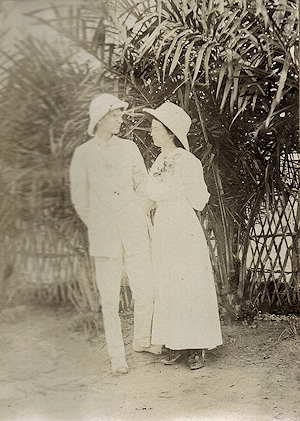
Grace and Sixten after their marriage visiting in Ibanche. May 1917.
|
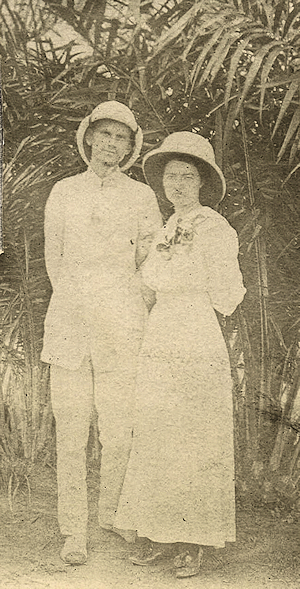
Grace and Sixten after their marriage visiting in Ibanche. May 1917.
|
The village work is well organized among
both men and women with committees appointed
to look after the sick and needy
and to keep up a lively interest in all departments
of the pastoral work. Mr. Edmiston
has a large number of Bakuba boys
in training, from whom to select evangelists
later on.
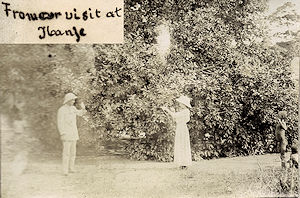
From our visit at Ibanje.
Sixten holds up a hand while Grace points a bow and arrow at him. A young boy at right seems uncomfortable watching the scene. May 1917.
|
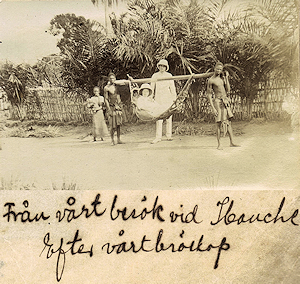
Från vårt besök vid Ibanche efter vårt bröllop.
From our visit to Ibanche after our wedding.
Grace in hammock ride with Sixten standing beside. May 1917.
|
In the Industrial Department, which is
confined largely to the one subject, agriculture,
we find a lively interest manifested
by the natives, who are being taught to
grow many kinds of vegetables, including
Irish potatoes, which they can always sell
to the white population at Luebo. It is a.
real treat to visit Ibanche and feast on the
good things Mr. Edmiston furnishes from
his garden, such as white headed cabbage, beans, celery, tomatoes, onions, potatoes,
etc., some of which have never been successfully
grown around Luebo. This department
also operates a large syrup and
sugar refinery, which supplies the whole
mission with these much needed articles
of food.
Bulape station was opened in 1915, and,
considering the many difficulties under
which this work has been carried on, it is
surprising to see how much has been accomplished
in so short a time. At times
the work was left with only one man on the
job. There are only two couples and a
single man, with work enough for twice that
number. Instead of building a lot of temporary
houses they have built substantial
office buildings large enough to give them
shelter, while the permanent brick structures
are in course of erection. One of
these brick houses is already well under
way and it is possible even now to see something
of what this new station will be
when all is completed. The office buildings,
which are now occupied as residences, will
then revert to their originally intended use
with, almost no loss arising from wasted
energy.
This station was designed as the center
of the Bakuba work, from which they
hope to reach out into every nook and corner
of Lukenga's kingdom. Already Mr.
Wharton has classified and reduced to written
form a large collection of the words
and phrases of the native language. Starting,
as they did, with only three or four
trained native evangelists, they have, neces
sarily, had to go rather slowly; still they
have made progress and are at present holding
53 out stations with only 16 evangelists.
They report good attendance upon all the
regular services with over three thousands
under Christian instructions. When we recall
the conservatism of this people we can
but wonder at the hold the gospel of our
Lord is gaining over them. This station,
like Ibanche, is laying great stress upon
the training of future workers by keeping
a large force of young boys under personal
oversight. The present king, Lukenga, Is
openly friendly to the mission, but being
weak and vaccilating in character, his influence
is not assisting our work to any
great extent.
Mutoto has had a very successful year
notwithstanding the heavy drain on her official
staff in opening up the new station
down in the heart of the Baluba country.
They report 896 additions on profession of
faith, in spite of the fact that they have
not been able to visit some of their out
stations for eighteen months. Had it not
been for the good work of the native pastor,
Kacunga, much more of their territory
would have had to go without a visit and
the results would have been smaller.
The attendance upon the regular services
still remains good both on the main station
and among the out stations, while the number
of enquirers continues to grow larger
all the time. Both Mutoto and Luebo have
added further requirements to the former
standards for admission into the Church,
lest out of these large numbers who are applying,
too many might, be admitted without
sufficient knowledge. Among the Luluas
there is a very strong prejudice, on
the part of the men, against all kinds of
work, but more especially the work of making
fields. Of these we require that every
male applicant who is physically able to
work, show that he works. In addition to
this, we further require that all applicants,
both male and female, be able to read in
the first reader unless they can produce a
good excuse for their inability. We make
the latter test because of its bearing on
their interest in the Holy Scriptures, which
we hope to have completed in their own
language before many more years.
In spite of these tests along with the
memorizing of the catechism, which is
something like our Shorter Catechism, and
the examination as to their personal knowledge
of the plan of salvation, all of which
would discourage any who are not thoroughly
in earnest, we still find the number
of applicants who fail on some one of
these requirements is larger than the number
accepted.
The Medical Department of Mutoto has
treated upwards of 12,000 cases during the
year. Dr. King has carried on his work
under rather trying conditions, having no
building for his department worthy of the
name of hospital or pharmacy. Funds are
now in hand, however, for the erection of
more commodious quarters, thanks to the
generosity of Mrs. James A. Butler, of Millersburg,
Ky. For a part of the time, Miss
Sophia Carlsson, who came to us from the
Congo Inland Mission about a year ago,
has been assisting with the medical work
In the capacity of nurse.
The day school continues to flourish,
though the former system of compulsory
education which was enforced by the chief
of the village, has fallen into disuse recently.
Mutoto is also planning for the
needs of the future by keeping a large
force of young boys under the personal care
of the missionaries. From this number will
be sent the choicest and most faithful into
the training school at Luebo, who will ultimately
be brought back into the work as
evangelists and teachers.
Mrs. King has a class of thirty promising
young pupils in French, in addition to
the course of instruction she has provided
tor the missionaries. Mr. Smith reports
that almost all the missionaries are now
able to say "Bon jour, comment allez vout" as fluently as if they had been brought up
in Paris. This speaks well for Mrs. King's
ability and patience.
Mr. Cleveland has just completed a much
needed administration building, which contains
separate rooms for the business department,
the evangelists' conferences and
a place to store the goods of missionaries
while at home on furlough.
The ladies of the station have organized
a class for the wives of evangelists who are
near enough to attend. This move will add
greatly to the efficiency of the out station
work, as a trained wife means almost the
same thing as an additional evangelist in
a village.
Lusambo, during the first five months of
the Church year, as well as during the entire
previous year, was handicapped by a
shortage of missionaries. Mr. and Mrs. Bedinger
being the only members of the station
during all that time. In March they
were made glad by the arrival of Dr. and
Mrs. Kellesberger, Mr. Hillhouse and Miss
Carlsson; the latter two being sent to Lusambo
for only a short stay. Mr. Hillhouse
expected to be there only a few weeks, but
when the submarine menace loomed up to
such threatening proportions he decided to
remain until the situation cleared a bit. As
a result of this delay Lusambo station, by
making use of Mr. Hillhouse's very valuable
service, now boasts a new pharmacy
with operating room, and also a new residence.
He has also made and burned some
25,000 good brick, and has added greatly
to the beauty of the station by making
paths and planting flowers and shrubs over
the compound. The concession has been
enlarged recently and now contains twelve
and one-half acres.
The statistical report shows that this has
been the finest year in the short history of
the work. In each department substantial
and encouraging gains have been made.
Eight regular evangelists and twenty-nine
voluntary teachers have been added to the
force; 174 converts were added on profession
of faith; there was an increase of
193 in the catechumen classes, of 313 in the
Sunday schools, and of 730 in the average
attendance at the services on Sunday mornings.
The total Christian constituency now
numbers 1,383. The average attendance at
the early morning prayer services was 1,135.
As an evidence of the sincerity of the converts
it is only necessary to mention their
growth in the grace of giving. The goal
set at the beginning of the year was the
doubling of their last year's gifts, but instead
of doubling they trebled them, giving
in all the sum of $317.80, which is a very
large sum when you consider the extreme
poverty of the people. It is more than half
of the cost of the entire out station work
of that field. The above figures remarkable in view of the fact that five
years ago there was not a single baptized
convert in all that region.
The medical department received a very
strong impetus by the arrival of Dr. and
Mrs. Kellesberger. They report 16,525 cases
treated during this year. Many operative
cases await the arrival of instruments and
other needed supplies which have been delayed
in transit.
New Station. This youngest child of the
mission has not yet been dignified by a
name. It is located in the village of Mbua
Matumba in the Katanga District, beyond
the southeastern border of the Kassai, about
150 or 200 miles beyond Mutoto, in the
general direction of Elizabethville. The native
population through this section is very
dense and the villages very large. The
Methodist Church (North) has a station
some 350 or 400 miles beyond this place and
they tell us that our Baluba people reach to
and beyond their station.
There is very little of a definite nature to
report from this new station as the work
is so new down there, but we mention it as
a matter of general interest because it now
begins to appear that we are to find some
boundaries to our work if we keep pressing
on. Mr. and Mrs. McKee, with Mr. and
Mrs. Edhegard, have been placed in charge
of this work.
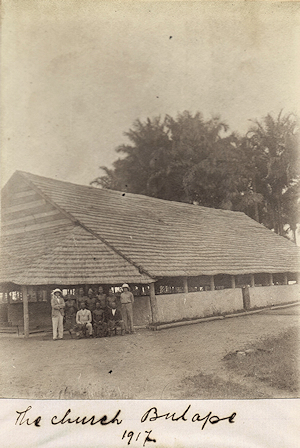
|
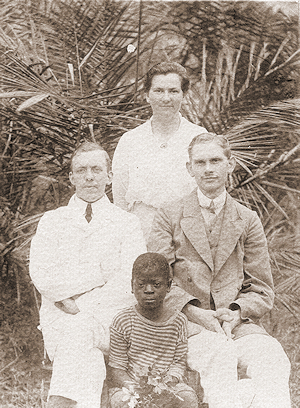
|
The church Bulape, 1917.
|
Djoko Punda, Congo 1915.
Seated left to right, Gunnerius Tollefsen and Nils Sixten Edhegard. Standing, Sofia Karlsson. Seated in front of the missionaries is an unnamed villager.
|
In this connection we would record our
grateful appreciation of the unselfish Services
of Mr. Edhegard and his two colleagues,
Mr. Talifssen (Tollefsen), of Bulape, and Miss
Sophia Carlsson, of Mutoto, who have come
to us from the Congo Inland Mission. These
devoted workers are entirely supported by
their own mission board in Sweden, and
are giving their services to our mission
gratis. They hope, however, ultimately to
establish another mission somewhere in
the Congo.
Literary Work.
We failed to mention, in its proper connection,
the completed translation, by Mr.
Morrison, of the four gospels and Acts.
These have been put into the hands of the
printer and will soon be ready for distribution
to the native church. We also mention
the translation, by Mr. Vinson, of the
first two books of the Old Testament. The
two brethren mentioned in this connection
have been set aside by the mission for this
special work of translating the whole Bible.
We rejoice with them in what they have
been able to do toward this end, and we
look forward with interest to the time when
we can give this Book of Life to our people
in their own tongue.
In summing up the work of the year
we find many reasons for encouragement.
The 3,161 converts; the 17,268 total membership;
the 35,648 pupils in our schools;
the $1,714.30 native contributions; the increased
interest manifested throughout the
entire field all speak of progress. We record
our deep sense of gratitude to Almighty
God for His wonderful blessing upon the
work of our hands, and we disclaim any
credit to ourselves for what has been done.
His power alone could accomplish this
mighty work, and to His name be all the
glory!
In conclusion, we call upon you, our brethren,
at home, blessed as you are with, so
many tokens of God's favor, to allow this
report to speak to your hearts of the needs
in this dark land, and to encourage you as
it has encouraged us to a deeper determination
to win this whole country for the
kingdom of our Master. He is breaking
down the obstacles that rise up before us
and he is calling to us to do our part. Will
we not do it for his sake?
A NEW RECRUIT AND SOME OTHER THINGS AT MUTOTO.
Written by Rev. Plumer Smith
Rev. Plumer Smith.
HERE is a film of our boy, John Newton
Smith, alias Loompoong. He
was about a year old when this was
taken. If you have not space to put it in
the Survey would you mind sending the film
to my father, Rev. Newton Smith, New
Madrid, Mo.? Loompoong is the first white
baby born in the Luluabourg district, and
the only white boy born in that district.
When I went to Luluabourg to register him
before he was a month old, I told the State
man that I thought as this was the first of
its kind, in fact, the only one in captivity
that he should give Loompoong a "dash."
He said that it was done the other way with
them, so I gave him one dollar for Loompoong.
He in return gave me a paper for
Loompoong, stating that he had been born
under the proper surroundings. Without
this paper Loompoong could never be married.
Remembering my past experiences I
could well appreciate the importance of such
a document. I want to get Loompoong married
as soon as possible, as I am afraid the
white ants may eat up that paper. The
State men had a hard time of it. The law
required that the certificate of birth should
state whether the parents were African or
European. They readily agreed that I was
not African, so I must be European. I resented
this. After the four State men had
discussed the matter for about an hour and
I still refused to be anything but "American"
de Amerique, they finally very reluctantly
put it down that way. It is a strong
palaver out here to be born, be married or
die. I never wish to repeat any of these
performances out here.
Mr. Crane has torn himself away from
Luebo for a short vacation and is out here
for six days to let us look at him. But
his primary purpose is to pick out some
men to go back in to Luebo to the Theological
school.
We are all well at Mutoto. Mr. Cleveland
has just gotten back from a trip and
Friday of this week Dr. King and I pull
out for a trip of two weeks. We have kept
Dr. King so close with so many babies to
look after that he can't get off the hill
very often.
We had 45 in our boys' academy here, but
as this is vacation month, many of them
are away, then also we are sending about
nine of them to the Theological school at
Luebo. We hope soon to start a home for
girls. It is so hard to do much with the
women and girls. In some villages the
women and girls do not even attend the
services.
It has been two months since we have
had any foreign mail and as there is yellow
fever at Matadi, it may be two months more
till we get any.
Our work has not grown much this past
year at Mutoto, due to the fact that the
majority of our trips have been devoted to
opening up the work in the Buluba, especially
establishing the station at Mbua Matumba. I was down there for awhile with
McKee, away from Mutoto four months and
four days. The work down there is growing
in spite of the persecution of the R. C.
Mbua is about 120 miles from here.
Our native ordained pastor, Kachunga, is
an unusually efficient man and is doing
good work. Perhaps you remember him as
the boy who was with Dr. Morrison in
America for two years about 1905, helping
him in his translation work.
While we are not getting much food from
the foreign land now, yet with the native
foods at our command, we are living fine.
Mutoto, December 5th, 1917.
OUR NEW CONGO STATION.
Written by Rev. Plumer Smith
Rev. Plumer Smith.
HERE are a few items from me from
which you may get something for
your work, s'il vous plait. I will write
you a letter then if you think well to use
any of it, well and good. If not this typewriter
paper starts off a fire just fine during
the cool November days.
As a boy, I often wondered what it would
be like to be the only missionary on one
station. For once in my life I have the
pleasure of holding down the front trench
all alone. Rather, I should say, that I am
In it; I am afraid that I am not holding
It down much. Leaving home April 19th
and visiting the out stations for three weeks
then coming down here to be with Mr. McKee. We were here together till last Saturday,
when he went in to Mutoto to get
his wife and daughter, as well as Rev. Sixten
Edhegard and wife. McKee has been
gone six days and will be back in two weeks
more. As there was much to be done in
the meantime and also as "Chief Anger," the
Roman Catholic priest, takes advantage of
our absences to oppress our friends and
persecute our native Christians, we thought
best that I remain till they get back. I
have dug trenches, worked in brick, doctored,
and incidentally preached about five
times since Mr. McKee left. I hope that I
will not be forced to retreat.
One of my boys declared that a buffalo
passed within one-half mile of here a few
days ago. I have been keeping the goats
of Mr. McKee tied on the porch at night so
that if a leopard came along I would give
him one, but how to appease the buffalo I
did not know. Having no doors, I wished
that this house had been built without doors
rather than places for doors as Robinson
Crusoe did. I owe some old buffalo a debt.
The last night on my way down here, I slept
fifteen miles from here. By four we were
up and moving. The chief of the village
came out to say "Good-bye." He warned
me that the elephants and buffalo did not
allow travelers to cross their dominions at
night and that unless we had the password
that we had better not risk it till daylight.
I told him that my lighted lantern was my
password. He let me have it my way, so off
we started with a man from the village in
front with the light. About one-half mile
while passing through a patch, of small millet,
we heard some animal tramping the
ground and blowing. It was pitch dark, so
we could not see, but whatever it was, was
about thirty feet away and seemed inclined
to stay there, so we ran. yelling, "Ugh, Ugh." There were about fifteen natives along. We
ran about forty feet and halted. We had
by that time seen many buffalo tracks with
the light. We started on again, but when
we got close again, we heard the tramping
and blowing. None of us had a gun, so away
we went over the cassava plants, yelling,
"Ugh, Ugh," at the top of our voices. That
is one of the strongest Buluba words I have
yet got on to. I do not know what it means,
but I certainly did yell it out till I was
hoarse. We beat a retreat, the rearguard
falling back in great disorder. We went
back one-fourth mile, sat down for a half
hour, then tried it again. Some yelled
"Ugh, Ugh," while some sang out, "I have
a gun from the foreign land." Another, "I
have a fighting knife." Sister Buffalo had
decided not to associate with, us, so we saw
her no more, nor has she since then written
us any letters. But soon we got near the
bottoms of the Lubilaxi, a river 150 yards
wide, which we had to cross. The guide
said, "The hippos come out of the river
and wander around in this tall grass and if
they see that light they will make for it in
a hurry. I had kept it burning in order
to keep the buffalo away, and now I was in
a fix. To blow out the lantern or not to
blow out the lantern was the question. 1
blew it out and then waited for the daylight.
I may say that I might have been
there yet flirting that lantern at Mrs. Buffalo,
but for the fact that there was not
much oil in the lantern and I was afraid
that once the oil was all gone that I would
be all gone. Two days before I had seen
some lion tracks in tbe path.
This is our new site that we hope the
government will give us. As the priest had
acted so badly, we thought best to come on
and build during the dry season. He told
the chief, who let us have this land, that we
had been driven out of everywhere but here.
Our two evangelists who have been in the
village of the chief for some time, had persuaded
him to pass a law that his people
should observe the Sabbath. The priest
came along and said, "The Protestants have
botched up this thing considerably, the Sabbath
is for the Christians, but God does not
want you old heathen to keep the Sabbath."
This is about 120 miles east of Mutoto and
240 miles east of Luebo. Some prefer to
call it 300 miles. It takes five days to go to
Mutoto from here. The village of the big
chief Mbua Matumba is across a little branch one and one-half miles to the east
of us. But then his land extends for six
or seven miles in all directions. He built
for us this nice house of three large rooms
and porch all the way around. The natives
called this hill "Lokonah," which one man
says means that there is not much here to
eat. There are now 31 native dwellings in
which 90 people live, who have come and
settled around us. And more are coming all
the time. So far we have not had time to
have school with them, though the workmen
have bought first readers and at dinner
try to learn what they can. Both of us
have been very busy doing this and that to
get the place ready to live in as well as
make enough brick with which to build
another dwelling.
The history of the place is something
like this: April, 1914, our superintendent
of this section, a native evangelist, came
here and called on the chief and on his
expressing a desire for an evangelist, two
were sent here in September, 1914. As it
was so far from Mutoto, it was thought wise
to send two instead of one. In 1916 two
trips were made down here by missionaries
which was the first time that the section was
ever visited by any of our missionaries.
Messrs. McKee and Cleveland came down in
February, 1917, and selected this site. After
they left the priest came to the village of
Mbua Matumba, forcing him to lock up several
Christians. The priest told the chief
that the two Protestant evangelists had to
be sent home. The priest would send itren
to see who and how many went to the
Protestant church every day. A message
came to Mutoto. Mr. McKee arrived May
15th and the writer May 17th. As the Commissaire
said that he would go ahead and
build on the site we did so. It was understood
that if we were not granted the site
by the State that we would bear all loss.
That is, we could not ask the State to be
out anything for our buildings.
We began work on the station May 30,
1917, cleaning it off. Our first service was
held that day on the station. It was held
under a tree, our evangelist preached. There
were 31 natives present. June 4, the State
man came and saw the site and was to
send in our application for it. So far we
have not heard from it.
I have some men making about 3,000
bricks a day, while just now I am trying to
build a kitchen and store combined for
Mr. McKee. I am using sun-dried brick, and
as the rains have begun it is a bit uncertain.
On Sundays I go over to the village
of Mbua Matumba and preach twice a day,
then come home in the late afternoon. It
is hard to be a jack of all trades. About
seven to eight people a day to be treated of
divers things. One half-grown boy today
asked me for some medicine to make him
strong. I advised him to confer with the
friend of Mr. McKee, the Mr. I. M. Working.
After dark a man came in from 25 miles
away to get some medicine for his mother,
who is bad sick.
On Sundays there are about 150 out at our
services. While these people are a bit conservative,
yet the Lord has his elect among
them, some of them I believe. When the
others come I will go back to Mutoto. I will
enter the reserves. But Mutoto is quite a
busy place now with about 160 out stations
to look after. When I quit my trip to come
down here, I left about twenty villages which
were visited last in May, 1915. I wonder
when they can be visited. I want to go to
Mutoto and renew my acquaintance with
my wife and boy and then school is on so
that I may not be able to get out again into
the country. I feel sorry for these people
who will be down here all the time. It Is
so far away. But then some one must have
the hard places and with the hardships
come the joys of "spending and being,
spent."

Foreign Missions
HOW THE A. P. C. M. CAME TO BALUBA.
Written by Rev. George T. McKee
REV. GEO. T. McKEE.
Magazine article from The Missionary Survey printed May 1921.
Published monthly by the Presbyterian Committee of Publication, Richmond, Virginia
|
THE letters A. P. C. M. may not mean much to you here in the United States, but over in Belgian Congo they mean very much to your missionaries, to thousands of natives, and to some government officials, though not always do they mean the same thing. When spelled out the words for which these letters stand appear to be the full name of your mission in Congo. "The American Presbyterian Congo Mission," the initials thereof constituting, as it were, our trade mark or trade name, the name stamped on all the cases of supplies sent out to us, and what you should put on all of your letters destined for any missionary on any of our five stations.
|
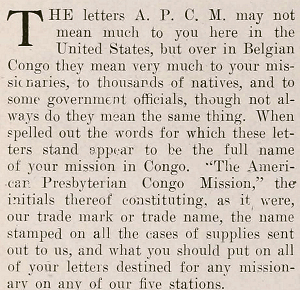
Magazine article from The Missionary Survey printed May 1921. - Click to see entire article.
|
In the months of July and August, 1916, Dr. R. R. King, of Mutoto, accompanied by the writer, made the finest prospecting trip into the far Baluba country, that is the country lying east of the Sankuru River. We were not prospecting for gold or diamonds, but a suitable spot for a new station to work among the great tribes of Baluba people. About six weeks were spent in traveling, but no definite spot was located. On this trip, however, we made friends with the native chiefs and their people. We even went as far east as Kabinda, capital of Lomani district, where the great chief, Lumpungu, chief of the Besonga people, lived. It was this chief, who with his cannibal subjects raided the Baluba country a few years ago, killing and enslaving thousands of the Baluba, and driving some of them into the Kassi district, where they settled at Luebo and elsewhere.
A second trip to definitely fix a site for building a new station was made the following March by Rev. Roy Cleveland and the writer. We had several interesting as well as exciting experiences on this trip, and located the site for the station in the domains of Bwa Matumba, chief of the Bena Shimba tribe of the Baluba. We chose a fine hilltop, some twenty minutes walk from the village of the chief. He and his people seemed delighted that we had come, and the five men inhabiting this hilltop with their families moved off in order for us to occupy, we paying them for the crops of sweet potatoes, corn and millet left standing about their huts.
Within six weeks after our return home to Mutoto we received an urgent message from the chief, Bwa Matumba, to come in all haste as the Roman Catholic priest had come after our departure and threatened all manner of terrible things to him and his people, because they had given us permission to occupy their land. Accordingly, word was sent to Rev. Plumer Smith, then on an evangelistic trip, to join the writer at the site in the Baluba country. Upon our arrival we managed to quiet the fears of the chief and his people, and after a visit of inspection paid the spot by the highest official of the government in the district, we were told that, no objections to our occupancy having been raised by the native owners of the land, none would be raised by the government itself, and that we might proceed at once to the erection of the buildings, and to the making of brick. Perhaps it will be well to state here that the country of these Baluba is all open plains, timber suitable for building being rather scarce and difficult to procure, hence our determination to build from the very start with brick.
Mr. Smith and about fifty workmen made over a hundred thousand brick that summer. In August Rev. and Mrs. Edhegard came down to Lukona, as the new station was called by the natives, and Mr. Smith returned to Mutoto after four months' absence from his family. The writer and family arrived September 1st, and the two families lived together in a three-room mudhouse built for us by the chief. There was much to do in these following months, part of the wide porch surrounding the house was converted into kitchens and dining rooms, a brick kitchen and storehouse was built, some very fertile land lying at the base of our hill, and watered by numerous springs and drained, and put into cultivation, timbers were got from a small strip of forest ten miles away, evangelistic work was started in several nearby villages, and of course had been going on for some time at the station, our first services being under a large tree, a church was built, and we were very happy.
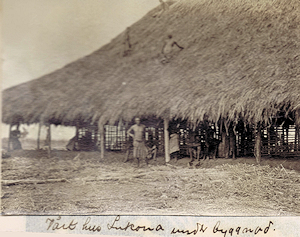
|
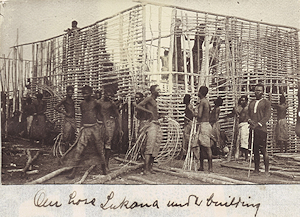
|
Vårt hus Lukona under byggnad.
Our house in Lukona under construction. 1917.
|
Our house Lukona under building.
|
We were greatly chagrined and saddened, however, the first of December to receive a letter from the vice-governor general at Elizabethville, refusing to grant us the concession, and requesting that we abandon the site of Lukona within 15 days from receipt of notice. A council was held, and while we had been offered by the mission the option of returning to Mutoto until other places could be looked over, it was unanimously decided to remain and to utilize those fifteen days in selecting a site free from all possible objections, and in building with all dispatch two grass huts after the native fashion. This was done, and on the fifteenth day we moved from Lukona in an all-day drizzle of rain to our new site some three miles north of Lukona, a still loftier hilltop in the domain of a tribe known as the Bahwa Kandue.
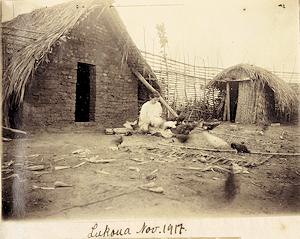
Lukona Nov. 1917
Grace caring for her flock in Lukona, Congo, November 1917.
|
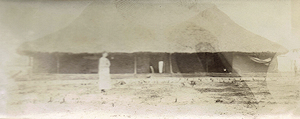
Grace in front of their home in Lukona wearing maternity clothes. The Edhegard couple arrived at Lukona in Aug 1917 and lived in a 3 room mudhouse built for them by the chief of the village. Rev. & Mrs. McKee arrived in Sep. and lived in the same house. Taken from Missionary Survey May 1921
|
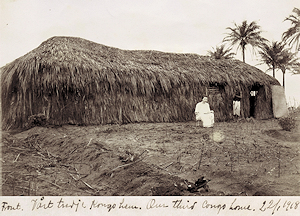
Front. Vårt tredje Kongo hem. Our third Congo home. 22 1, 1918
January 22, 1918. Grace sitting in front of their grass hut house. Junior was born in this hut, May 3, 1918 in Bibanga, West Kasai, Congo, Africa.
|
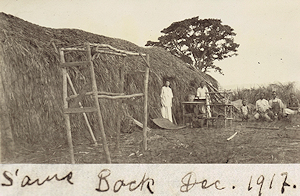
Same Back Dec. 1917.
Grace standing at the back door of their grass hut house, wearing maternity clothes. The Mission work at Bibanga, American Missionary station was founded by Rev. Sixten Edhegard and Rev. George McKee in 1917.
|
|
The new site was called by the natives Lilanga, and by careful measurement its altitude had been ascertained to be 2,800 feet. Through a sweep of one hundred and eighty degrees, from north to south, one looks out over the great Sankuru, or as the natives call it, Lubilas hi, valley. In the afternoon one counts the smoke from evening fires of many villages scattered throughout this beautiful valley. From the hillside several springs of pure water break out, and there is an abundance of firewood, though building timbers are still far distant.
|
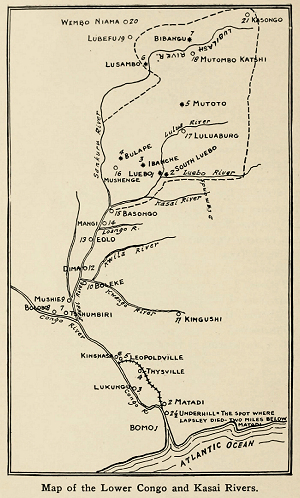
1917 Map of Africa. - Click to see larger image.
|
The soil here at Bibanga is excellent for cultivation, and it is the ambition of those at Bibanga to some day have an agricultural school located there for the training of the thousands of Baluba girls and boys who live in that great country. Within a radius of ten miles there are twenty-five thousand pupils. Bibanga is just about in the center of a triangle formed by three large villages of about 5,000 population each. Bibanga assuredly has a great population upon which to project the gospel.
The grass huts at Bibanga built by us were about 35 feet long by 10 feet wide, and the ridge pole was ten feet above the floor which consisted of about 4 inches of clay laid down on top of the ground and beaten hard and smooth. Our doors were only mats swung over poles left in the grass walls. The kitchen was a smaller hut built in the rear of the house. In the dwelling house we had our bed room, our dining room, our office and reception hall, it being extremely difficult to tell where one room left off and another begun, since there were no partitions, but as long as it did not rain too hard and blow too strongly we were comfortable and enjoyed our experiences, feeling in some respects at least we were being permitted to do pioneer work.
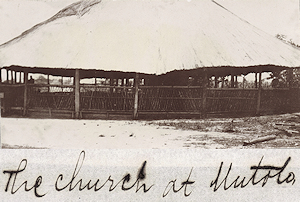
|
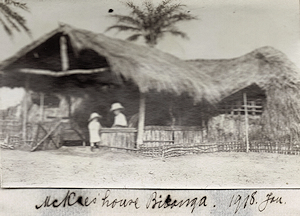
|
The church at Mutoto.
|
McKee's house Bibanga. 1918. Jan.
|
Dr. E. R. Kellersberger and Mr. W. L. Hillhouse came down to Bibanga in April, 1918, and the latter commenced work at once on the erection of two "mud palaces," one for Dr. Kellersberger and family, and one for the McKees. With the untrained native labor, few tools, rather unpromising sticks, etc., together with the high winds which blow steadily during the dry season, the two houses were finished with some difficulty, but seemed truly elegant after the straw huts. In one of these grass huts little Sixten Edhegard, Jr., was born and lived for several months before beginning with his parents two hundred and fifty mile journey to Luebo, and on to the white man's country. Of his illness en route and subsequent death you, no doubt, are already aware.

RETURNING FROM CONGO.
Written by Rev. Plumer Smith
Plumer Smith.
Thysville, Congo Belge,
March 14, 1919.
Newspaper article from The Presbyterian of the South printed May 28 1919.
|
We are now on our way home, Edhegards, Whartons, Schlotter and Smiths. Though we left Mutoto January 31, we have done only fifteen days of traveling. We left Mutoto just as the flu was getting there. Stopped at Lusambo ten days and left there just as it was getting there. As it is finished down this way, we hope that we may not have it. We are all well.
|
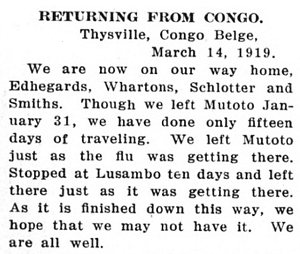
Newspaper article from The Presbyterian of the South printed May 28 1919. - Click to see entire article.
|
Anversville, a Belgian steamship, sails from Matadi March 24th, and we all go on her. I forgot also that Mr. Tollefsen, who has been working with us, is going home to Norway on the same boat. There is to be a large crowd going home, Belgians, English and some Swedes.
One Swede of the Swedish Mission who is going home on this boat has lost eleven stones during this term.
We were glad to see that Mr. Rochester came out on the Anversville. One came on it and eight are leaving on it. At that rate, our mission will soon be depopulated.
Mr. and Mrs. Bedinger will probably be leaving for their furlough in about a month. It looks like the work will be bound to suffer unless some more are sent out, and that soon.
There is an English Baptist station here, and the missionaries have been very nice to us, lending us papers and books, invited us to tea, allowing their servant to mind our baby, and in many other ways.
There are some Englishmen going down tomorrow, but were waiting here, one day's railroad journey from Matadi, as the hotels at Matadi are full. Last night they got out and sang English songs till after 10. It sounded a bit strange to hear English, rather old plantation songs, being sung out in Africa. Our landlady is French, but speaks English quite well, so we are O. K. on that score, but the native boys here have a hard time with our lingo. Now since the war, so many of the Belgians speak "small Engleesh."
At times traveling with two babies is tiresome, especially if their training has been neglected. Our boy, two and one-half, does not like riding on the train, as he cannot see the engine. On the river steamer he did not like it because we did not let him climb up on the railing. We are to go down to Matadi tomorrow and go at once on to the Anversville. We hear that she sails to Falmouth, England, and then to Antwerp or Anvers, as the Belgians say.
We will spend some three or four months with my father, Rev. Newton Smith, Ararat, Va.
Plumer Smith.
Eleven stones converted to pounds would be 154 lbs.
The Spanish flu pandemic killed millions of people worldwide. Read more here
1918 through 1920 flu pandemic and here
Spanish flu.

AFRICAN MISSIONARIES ON THEIR WAY HOME.
Written by Rev. Plumer Smith
Plumer Smith.
La Pillice, France,
April 18, 1919.
Newspaper article from The Presbyterian of the South printed May 21 1919.
|
Our party on board S. S. Anversville are to land at Falmouth tomorrow after a voyage of twenty-five days from Matadi. The party consists of Mr. and Mrs. Wharton and baby, Mr. and Mrs. Edhegard, Mr. and Mrs. Smith and two babies, Messrs. Schlottler and Tollefsen. On March 31, 1919, Sixten Edhegard, Jr., aged thirteen months, died and was buried at sea. He was sick only five days. It was so sad.
P. Smith.
|
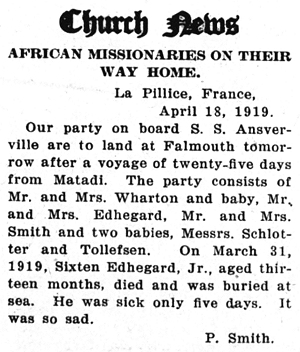
Newspaper article from The Presbyterian of the South printed May 21 1919. - Click to see entire article.
|
The Spanish flu pandemic killed millions of people worldwide. Read more here
1918 through 1920 flu pandemic and here
Spanish flu.

A LITTLE CHILD SHALL LEAD THEM.
Written by Rev. Plumer Smith
Plumer Smith.
Newspaper article from The Presbyterian of the South printed July 2, 1919.
|
Some months ago our hearts were made glad by the announcement that a little child had been born, a son to Rev. Sixten Edhegard and wife. There was on the announcement a photo of the grass hut in which he was born. Their permanent home had not been built, so that his birthplace was not pretentious at all, due to the fact that the station was still also in her infancy. The little boy grew and only about two months later his father and mother came to live at Mutoto. One hundred and twenty miles in a hammock is a hard trip for a grown man, but Sixten, Jr., or Lutonga, as he had been named by the natives, stood the journey well.
|
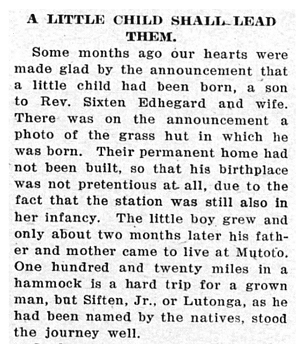
Newspaper article from The Presbyterian of the South printed July 2, 1919. - Click to see entire article.
|
On hearing of their arrival, we all went to see the father and mother, but especially Lutonga. He lived up to all reports, being a well, strong and wide-awake boy.
Time passed and the boy grew, always being well and full of life. Living on the same station, we saw much of him. When the time came for his parents to go on their furlough he went with them, being a cause of wonder and amazement to the natives en route.
We had been on the steamer on the way to America only about a day when he was taken sick at Boma. The doctor was called. When he came he said, "The child will be very sick for five days and then he will be better." That was Wednesday, and we anxiously inquired, hoped and prayed that Lutonga would be spared, but about sunup, March 31, 1919, the tired little soul left us and at sundown the little body was buried beneath the waves of the Gulf of Guinea. Had he lived three days longer he would have been eleven months old. Pray for his suffering parents in their sad affliction.
The birthplace of Lutonga ere this has been torn down. No man can tell where is his grave, but shall his memory be lost? Our eternal Father will not allow his life to have been wasted. His parents will keep green his memory in their hearts. Those of us who have known him can never forget him. Will not some one take his place in the ranks? While only a child, yet potentially a herald for Christ in Congo. May not some one be led to come to this land and do the work that Lutonga cannot now do?
Plumer Smith.
The Spanish flu pandemic killed millions of people worldwide. Read more here
1918 through 1920 flu pandemic and here
Spanish flu.

DEATH OF SIXTEN EDHEGARD, Jr.
Written by Rev. C. T. Wharton
REV. C. T. WHARTON.
Magazine article from The Missionary Survey printed January 1919.
|
Mrs. EDHEGARD was formerly Miss Grace Miller, who went out as a trained nurse to the Congo field in 1916 and who has rendered splendid service during her first term.
|
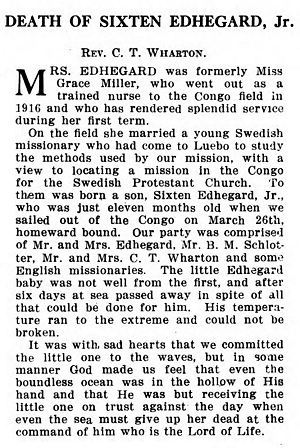
Magazine article from The Missionary Survey printed January 1919. - Click to see entire article.
|
On the field she married a young Swedish missionary who had come to Luebo to study the methods used by our mission, with a view to locating a mission in the Congo for the Swedish Protestant Church. To them was born a son, Sixten Edhegard, Jr., who was just eleven months old when we sailed out of the Congo on March 26th, homeward bound. Our party was composed of Mr. and Mrs. Edhegard, Mr. B. M. Scholtter, Mr. and Mrs. C. T. Wharton and some English missionaries. The little Edhegard baby was not well from the first, and after six days at sea passed away in spite of all that could be done for him. His temperature ran to the extreme and could not be broken.
It was with sad hearts that we committed the little one to the waves, but in some manner God made us feel that even the boundless ocean was in the hollow of His hand and that He was not receiving the little one in trust against the day when even the sea must give up her dead at the command of him who is the Lord of Life.

In a letter dated April 2, 1985, nine years after Grace's death, her youngest brother Henry Miller wrote to Edward C. Lyrene, III.
"Your great grandmother Grace was almost a perfect person. To the end of her years Grace was a faithful, uncomplaining person ever working to make life Christian. Were Grace now physically present she would be proud of you and yours. Uncle Henry"

Written by Debbie Owen
July 2024

Follow these links to see more on this topic:
THE EDHEGARD MISSIONARIES
Congo, Africa 1915-1917
Written 2020
by Debbie Owen

PICTURES FROM CONGO
A Photo Album of Photographs taken in Congo Africa.

Resources
ChatGPT, ChatGPT 4.0 version, OpenAI, June - July 2024, "ChatGPT was used as an OCR engine to convert the image of a newspaper article into the text of the article. OCR stands for Optical Character Recognition."
https://openai.com/
Google Books. Presbyterian Church in the United States, 1916 - Missions,
Title: "The Missionary Survey" VOL. VI, May, 1916, No. 5
Wade C. Smith, Editor.
Presbyterian Survey, May, 1916.
Google Books. Presbyterian Church in the United States, 1919 - Missions,
Title: "The Missionary Survey" VOL. IX, January, 1919, No. 1,
Wade C. Smith, Editor and Laura E. Armitage, Assistant Editor.
Presbyterian Survey, January, 1919.
Google Books. Presbyterian Committee of Publication, 1919. By Presbyterian Church in the U.S. General Assembly.
Presbyterian Minutes 1919.
Internet Archive. In the heart of the Congo
by Crane, Chas. L. (Charles LaCoste), 1884-1953,
Publication date 1923.
In the heart of the Congo.
Internet Archive. The Missionary Survey
by Presbyterian Church in the U.S.,
Volume v.7, no.4 (Apr. 1917).
The Missionary Survey.
Internet Archive. The Missionary Survey
by Presbyterian Church in the U.S.,
Volume v.7, no.11 (Nov. 1917).
The Missionary Survey.
Internet Archive. The Missionary Survey
by Presbyterian Church in the U.S.,
Volume v.8, no.1 (Jan. 1918).
The Missionary Survey.
Internet Archive. The Missionary Survey
by Presbyterian Church in the U.S.,
Volume v.8, no.4 (Apr. 1918).
The Missionary Survey.
Internet Archive. The Missionary Survey
by Presbyterian Church in the U.S.,
Volume v.8, no.6 (June 1918).
The Missionary Survey.
Internet Archive. The Missionary Survey
by Presbyterian Church in the U.S.,
Volume v.11, no.5 (May 1921).
The Missionary Survey.
Internet Archive. Triumphs of the Gospel in the Belgian Congo
by Bedinger, Robert Dabney.
Publication date 1920,
Publisher Richmond, Va.: Presbyterian Committee of Publication.
Triumphs of the Gospel in the Belgian Congo.
Newspapers website. The Miami Republican of Paola, Kansas, and The Western Spirit of Paola, Kansas, and Capper's Weekly of Topeka, Kansas.
https://www.newspapers.com/
W3C Spell Checker. Online tool that will check the spelling of a web page.
https://www.w3.org

|